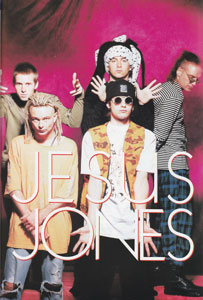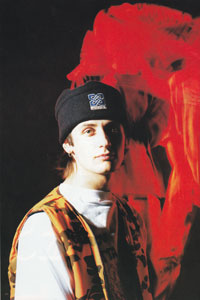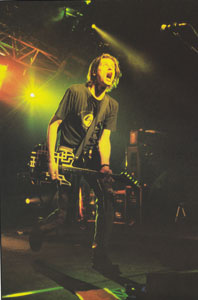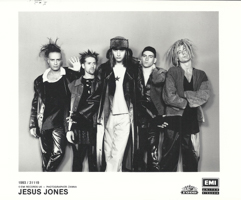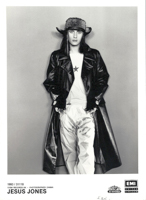
1993
Chronology (from the original Jesus Jones website)
January - "The devil you know" single climbs to #10 in the UK, followed by "Perverse"'s debut at #6.
March - UK tour co-incides with the release of "The right decision" single.
April - May - Another big US tour whereby the band worship at the shrine / eating experience that is Denny's so often that they memorise which soup is available on which day. These things count on tour, apparently.
June - Tour Japan for the third year in a row and release "Zeroes and Ones".
September - Work starts on the next album. At a very leisurely rate.
Foreword
1993 sees the appearance of the long awaited third album 'Perverse'. The crest of the wave from 1991 is slowly subsiding despite 'The Devil You Know' reaching No.10 in the UK. The album sells over 500,000 copies and charts at No.6 but when that is on the back of an album like 'Doubt' record company bosses are hard people to please. The fan would probably say that this is as good, if not better, than the previous two albums but it's money in the tills that counts in this business.
Jesus Jones promo photos (Credit - Aleutia Shannon) click to open a bigger version
A short promotional tour of Europe was undertaken in January and February followed by Mike and Iain promoting the album in America and Canada. In March 'The Right Decision' was released followed by a UK tour. Tours of the US and Japan follow and 'Zeroes And Ones' is released. The next album is started...
Mike Edwards also began delving into the world of remixing other bands material. Take a look at the releases page for details of these.
Click any button below to view. Click again to close the section.
Jesus Jones band photo - 1993
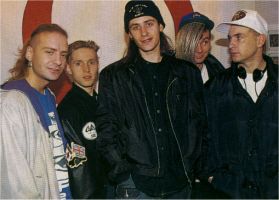
Review of The Devil You Know - NME - 2nd January 1993
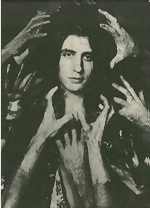
Ironically
purporting to be a condemnation of the lack of spirit, adventure
and danger endemic in modern pop culture, 'The Devil You Know'
is itself about as chilling and surprising as the discovery
of a wad of used Kleenex in a pubescent male's bedroom.
It's the same old JJ formula: audaciously squeaky beats sidle up to bratty,
vacuous guitars, proving only that sometimes rock and dance can spend the whole
night together and still fail to rustle up so much as a hickey between them.
As for Edwards, it has always been my quirk never to trust a man whose face
could pass comfortably through the eye of a needle and, judging by these vocals,
(imagine the death rant of a blind, syphillitic labrador chained to an electric
fence) I'm still right.
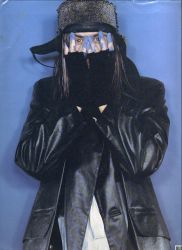
Perverse Launch Invitation - January 20 1993 - click for a bigger version
Perverse Badge - 1993 - click for a bigger version
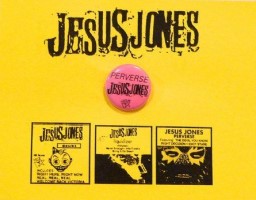
Review of Perverse - Website The Tech - January 1993
Jesus Jones adds dark tones to driving sound on Perverse
Perverse Jesus Jones. EMI Records.
By Douglas D. Keller Photography Editor
The winds of rock can be kind or cruel. Bands that enjoy great success may
continue to do so for many years or may fall by the wayside within a couple
of months. Albums that seem to speak to us, move us, may soon be collecting
dust upon our CD racks. The latter often occurs in alternative rock, where a
band can forge out a new style only to be overshadowed and sometimes crushed
by its successors. Until their new album, Perverse, reached me last week, I
thought that Jesus Jones had been swept aside. It was less than two years ago
that they released their second album, Doubt, which spent six weeks at number
1 on Billboard's Alternative Chart. In the spring of 1991, they were one of
the major attractions at the Earth Day concert in Foxboro and played the same
night before a large crowd here at MIT as the headliner for Spring Weekend.
I nearly wore grooves in the CD playing it over and over during the spring and
summer. I don't know if it was because "Right Here, Right Now," "Who? Where?
Why?," and "Real Real Real" were overplayed on the radio or on my CD player,
but I now find it difficult to listen to the whole album in one sitting. I have
always enjoyed listening to Jesus Jones for their socially conscious lyrics
and creative samplings but Doubt will always stick in my mind as an extremely
"poppy" album. This is not the case with their new Perverse, by far a darker
and more brooding album than its predecessor. The songs are a significant departure
from those on Doubt as the band continues its extensive use of sampling, "drum
type sounds," and keyboards to create a driving sound. Perverse is by no means
a techno album, but there are distinctly techno elements within most of the
songs. Songs such as "Idiot Stare" make extensive use of repeating drum tracks,
but there are fast and slow movements within the song which add a richness to
this and other tracks that is missing in most techno singles. At times the album
presents contradictory messages. For example, the pounding track "Magazine"
celebrates the distortion of current events in the media while "Don't Believe
It" makes a biting criticism of the media. The liner notes for "Don't Believe
It" read "May '92, with a little ignorance and media manipulation, there is
a whipping boy for every occasion. On our side, truth, decency, and the right
way to talk, on the other side, our perfect enemy out for revenge." Jesus Jones
is the collaboration of Jerry De Borg (300 hz to 8 khz), Al Jaworski (20 hz
to 4 khz), Gen (drum type sounds), Iain Baker (omnipresent), and Mike Edwards
(first generation (unsampled) vocals, and sole writer). The first track on the
album is "Zeroes and Ones," which is fitting since most of the music on the
album was recorded onto floppy disk at Mike Edwards's house. "Zeroes and Ones"
concerns itself with the increasing prominence of computers in daily life, from
pocket calculators and shopping at home to missile guiding and virtual sex.
The song is both a celebration of the power of computers and a warning about
the control that they exerts over our lives. It is difficult to guess the course
of musical history, to be certain whether Perverse will be a "future classic"
or will be collecting dust in six months. Techno seems to be reinventing itself
every six months and the message and method of Jesus Jones' latest may be archaic
in a year's time. Still, Perverse is an engaging album with very contemporary
ideas and the potential to shape the course of alternative and techno in the
near future.
Copyright 1993 by The Tech. All rights reserved.
This story was published on Wednesday, January 20, 1993. Volume 112, Number
66 The story was printed on page 6.
This article may be freely distributed electronically, provided it is distributed
in its entirety and includes this notice, but may not be reprinted without the
express written permission of The Tech. Write to archive@the-tech.mit.edu
for additional details.
Japanese Magazine Photos - Music Life - January 1993




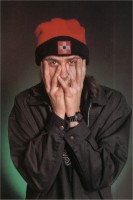

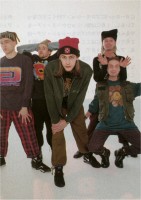
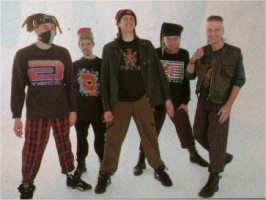





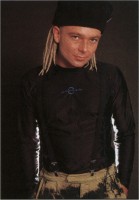

Review of Perverse - South African Penthouse - circa January 1993
Finally, kids: rock 'n roll, or at least as close as you're going to get to
it in the Nintendo-intensive nineties. Perverse (EMI) is the
new album from Jesus Jones, the British quintet with a fix on
the free-floating mantras and the ragas of the Strawberry
Fields era, set to an accelerated drumbeat and a force field
of distorted digital effects.
It's a sort of cross between a migraine and an out-of-body experience,
and although the beat has moments of promise, it all vaporises
into the ether amidst the kind of self-conscious posturing that
was supposed to have gone out with Sigue Sigue Sputnik.
Come back, Mick Jagger, all is forgiven.
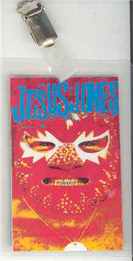
Review of Perverse - probably from NME - circa January 1993
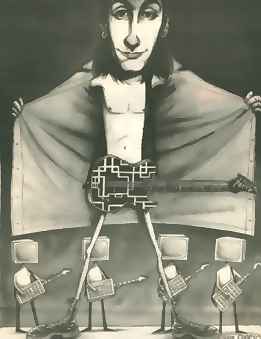
One
thing about Jesus Jones that sticks in the throat is how little has been
made of their dubious image as a band. In some puritanical corner of my
mind, this carefully nurtured rock 'n' roll fallacy indicates some kind
of moral corruption. The fact that multi-intrumentalist Mike Edwards works
in solitude, flanked by banks of technology as opposed to his hired hands
(which is all, in effect, the rest of the band are) seems a bit of a con,
really.
Big deal, say you. This is 1993, Mr Indie Saddo, not a world of residencies
at The Reeperbahn and paying your dues. So what if Richey Manic mimes his guitar
parts live while floods of retroriffing pours from the PA? Who cares whether
EMF use tapes as long as the effect is an apocalyptic rock event? Get wise,
pal. This really is the modern world and, as it goes on 'Zeroes And Ones', "The
revolution will be computerised".
When they say that technology is replacing musicians, they're not kidding.
The sleeve notes to 'Perverse' take good care to thank Shure microphones, Ernie
Ball strings, Music Man basses, Gibson guitars, Zildjian cymbals - are you bored
yet? - Gallien Krueger amps and Trace Elliot speakers, all without a mention
of 'the band'. The recorded stuff appears suitably single-handed and draws a
rather drab portrait of our time. Adopting a clutch of rather dubious progressive-pop
influences (Runaway! It's the revenge of It Bites! - Ed). Edwards
lurches from simplistic 'dawn of the New Age' lyrics with the aforesaid 'Zeroes
And Ones'. through idle navel contemplation ('From Love To War'), ending up
in the grip of the rock cliche. I mean, do we really need another songwriter
telling us how confusing being an internationally travelled pop star really
is? The pain! The torment! Oh, do leave it out...
There are a number of panoramic tributes to the Nine Inch Nails school of industrial
pop, 'Your Crusade' being the best of them, but largely this is not jumping
up and down at your keyboard music - although I guess the little fella with
the Stussy hat'll have a blood good try.
The only time where the blanket of disapproval is lifted is with 'The Right
Decision'. Punchy, melodic and worth a fiver's bet as a prospective Top Ten
hit, this is where Edwards gets it right. Using his impressive range of musical
knowledge, he flirts with Eastern and gospel vocal samples, adding Lennon-esque
backing harmonies to neat effect. Forgivingly, this erases the memory of 'Magazine',
in which he manages to whine and drone at the same time about, yes, you've guessed
it, magazines.
Ok, so Jesus Jones were among the first to mess about with what was painfully
coined indie-dance, along with bands like Pop Will Eat Itself and That Petrol
Emotion,. Edwards' invention gave an initial adrenalin rush with wild samples
and chunky hip-hop patterns - then developed a more cultivated sound resulting
in multi-million sales worldwide and a Number One US single last year. But as
commercial concerns stifle his creativity, you get the feeling that he'd be
best served cutting loose from his day job, making a f--- off techno track or
an ear-splitting hardcore album. As it is, he's caught between a rock and hard
place, making increasingly predictable music with inevitably diminishing creative,
if not commercial, results.
File under 'Too Easy Listening'.
Perverse Mask
This is one of the original masks from the photos on the album cover. This is the one that is owned by Jeff in the USA, the other one is owned by Mike.

Review of Perverse - Vox Magazine - circa January 1993
Three albums on, Mike Edwards is making resonant and thought-provoking adult pop. The only question is: can you bear to hear these see-sawing Techno rhythms - not to mention That Voice - enough times for the songs to start making sense? Perhaps it's fitting that a man who appears to have rubbed-out his entire band in a bloodless coup should sing like Marlon Brando's Godfather...
Patient listening will certainly pay dividends on the more frenetic tracks here - particularly the single, 'The Devil You Know', with its delicious minor chord changes and bizarre vocal melody; and on 'Get A Good Thing', where Edwards drops the usual, theoretical stance in favour of something a little more close to the bone. The three central pieces are still easier to admire - mostly slower and more fully-evolved than Edwards' standard line in hyper-active pop. 'From Love To War' is probably the best: a highly-complex dissection of masculine emotions built over a dense rush of sound. "Should I hold you to the light - would I see right through you?" he breathes, caught between the desire to analyse his feelings and the fear that that might destroy them. "From love to war - what we aim for is to keep the illusion," he concludes. Well, maybe.
'Yellow Brown' may, or may not be, a drug song - it's certainly the oddest thing to flow from Edwards' biro. Unhurried, obsessional and lush, it's like the track you'll return to most quickly.
Like 'International Bright Young Thing', from the Doubt album, the opening 'Zeroes And Ones' could be the modern world as seen through the eyes of a 1920s science fiction writer - big, shiny and impossibly optimistic. It's Edwards' favourite state of mind. What a shame he makes it so difficult to share.
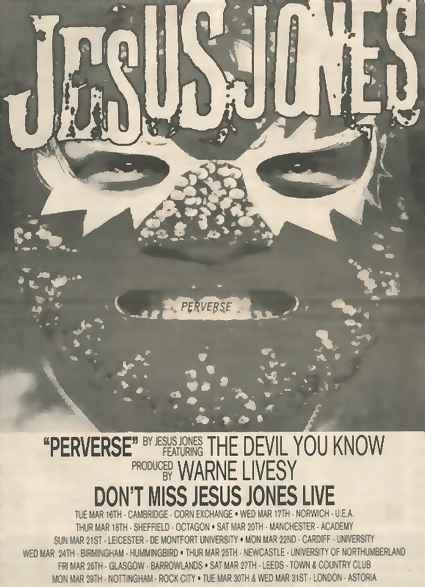
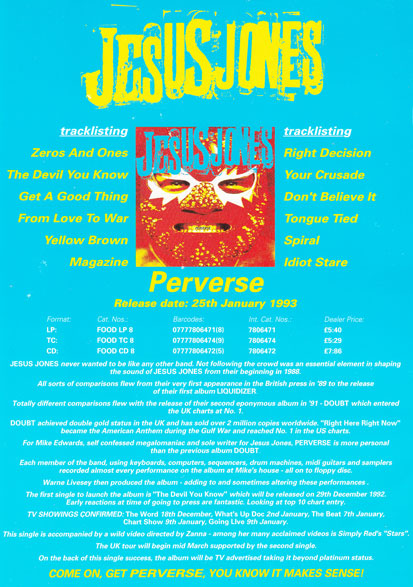
Review of Perverse - Melody Maker - 16th January 1993
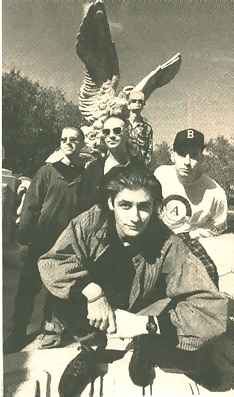
Don't
know about you, but Mike Edwards has always irritated the f***out of me
- that smug, know-it-all grin. But I have to concede that he's a smart
cookie. He says "Rock MUST engage with techno", and he's dead
right. Rock's current immersion in the Seventies (Sabbath/boogie rehabilitators,
Krautrock revisitors, glam/kitschadelics like Pulp and Denim) is highly
entertaining, but a dead end. Rock can and must learn from the timbal
invention, the sampling sorcery, the riffs and riddims of hardcore techno.
Mr Edwards' rhetoric intrigues me because it corresponds to a personal pipedream:
that a band would do for 'ardkore what Primal Scream did with the dub-trance-acieed
sound on "Higher Than The Sun", ie a fusion of rave and rock that's
Higher Than The Sum (of its parts). There seems obvious connections to be made
between bombastic Beltram-style techno and the Sabbath/Stooges lineage. And
even though 'ardkore is now less electronic and more like hyped-up hip hop,
with the "junglist" craze (funky breakbeats, ragga incantations, helium
vocals), there's still scope for a sort of speed-freak Happy Mondays, a mashed-up
mob of reprobates.
But is Mike Edwards the man for the job? Judging by "Perverse", the
answer is a resounding "fraid not". A long time ago, I dismissed Jesus
Jones as New Wave with techno knobs on, and there's little here to make me retract
that verdict. The opener, "Zeroes And Ones" is kickstarted with a
mildly slammin' 'ardkore riff and pulsating bassline, but quickly lapses into
Jesus Jones rote-work: faintly psychedelic rock, smothered in Edwards' breathy,
airy, melodious voice. The merger of techno and rock Jesus Jones are wreaking
here is Blur meets The Shamen, rather than Prodigy fistf***s Young Gods.
Lyrically, "The Devil You Know" is all about striding fearlesssly
into the phuture, rather than cowering in rock's archives, but it sounds
dated. It's "Stadium House", but possibly not what The KLF had in
mind: mega-production values, tingly mock-Eastern touches, and a stratospheric
melody that unfortunately reminds me of Yes-man Jon Anderson's "State Of
Independence".
"From Love To War" has Edwards resorting, not for the first nor last
time, to his favourite melodic trick: extending the last word of the line, "Drea-ea-ea-eam",
pumping it full of breath and swathing it in echo.
"Yellow Brown" is the first interesting track, a foray into the abyss
of melancholia. There are baleful, treated noises, and looped samples of voice
low in the mix, like morbid thoughts preying on the mind. It's pretty, faintly
reminiscent of Japan's "Ghosts" (Orientalism + despair + synthesizers).
But "Perverse" quickly reverts to type. "The Right Decision"
is "dance rock" (that is, you can't dance to it, and it doesn't rock),
and shows that Edwards' ideas haven't moved forward significantly since that
dizzy month when "Right Here Right Now" and EMF's "Unbelievable"
invaded the US Top Ten.
"Your Crusade" is an ungainly, clangerous mish-mash of rave'n'roll
"worthy" of Ministry or EMF's second album. "Don't Believe It"
has an aciiied bass-machine vortex as its pulse, but this faint stab at futurism
is suffocated, yet again, with soaring Sixties harmonies.
The best comes last. "Tongue Tied" tangles tablas and sitars around
a jagged, geometric riff and viscous bass-pulsations that are poor relations
to Beltram's "Energy Flash" and "Mentasm". Here, at last,
Edwards approaches the techno-rock mutation he's fanfared so loudly in the press.
But if only his tongue was tied, rather than busy filling up every space
in the soundscape with his usual nasal harmonies. On "Idiot Stare",
he briefly gets it all right, whispers and feeds his voice through effects,
and insinuates his way through a mildly menacing maze of eerie looped-vocals
and glutinous textures. But let's not be too generous: the track is still funkless
and overwrought, not the 'ardkore/punk dream-fusion but just a decent slice
of industrial disco a la Front 242.
What's missing from "Perverse" is the rush, the hyper-kinetic exhilaration,
of current rave. Well, fair enough, Edwards has been listening to the more sombre,
musicianly brand of "Intelligent Techno" (dance music for the sedentary),
and besides, the album's vibe was shaped by a grievous bout of depression. A
more damning charge is that Edwards,a skilled musician, has embraced the new
technology but failed to come up with a single startling noise to match the
f***ed-up concatenations of samples and diabolic timbres that are routinely
and randomly knocked up by musical illiterates from Dalston to West Norwood.
In the end, Jesus Jones belong in that category of bands (That Petrol Emotion,
Age Of Chance) who have impeccable taste, who know "what time it is",
but just don't have what it takes to make a mark on that time, and instead just
syphon off energy and ideas from the underground. This album will doubtless
"do well", appealing to the sort of people who imagine Nine Inch Nails
are "on the edge". But "the second album of the Nineties"?
Jesus Jones as a band deserving of mention in the same breath as The Young Gods?!?
Bang out of order.
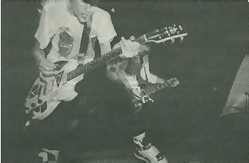
Interview - Indiecator - circa January 1993

"I
can't wait. I can't wait to get out there! I can't wait to talk about
it. I can't wait to get out there and play. Everything! I can't wait to
be part of the whole machine again. It's what I've based my life on really!"
Mike Edwards is here tout seul because he is Jesus Jones, ostensibly
speaking, that is. Everybody knows it really. His fellow Jones' - Iain
Baker (keyboards), Jerry De Borg (guitar), Al Jaworski (bass) and Gen (drums)
- whilst themselves no mere musical side kicks, are nevertheless not required
to sit in on interviews because, well, what's the point? Edwards writes all
the songs, all of the lyrics, calls all the shots, all of the er... everything
really. He is, you might say, the large fromage.
Edwards has 'third-album-nerves-syndrome', a potentially crippling condition
that affects every major band at this stage in their career, and things are
definitely different in the Jones camp. Why, Edwards has even managed to shrug
off that nagging old 'control freak' tag that has ball-and-chained him for so
long. This time round he's confounded everyone by bringing in a producer to...
er... produce the twelve track affair known as 'Perverse'.
"The way that I can put a value or judgement on this album," says
Edwards, cradling a mug of cocoa, "is that I've never been able to listen
to one of our records a month after they were finished but I can still listen
to this one now and enjoy it and that's largely to do with the fact that I had
this guy, Warne Livesay, producing it. He's what I'd think of as an archetypal
producer. In other words, he's someone with artistic and creative ideas who
comes in to add a little bit extra. I think that the thing with Jesus Jones
is that it's always been very much my affair. I write all the songs and I produced
the last album and all that kind of stuff, and with this album it really was
the right time to have someone else put something in. I didn't think it was
really going to come from the band, because I think that perhaps the band are
a little used to their roles, but as a result of that extra input we've made
an album that I think is really good. There's an element of mystery that makes
me want to listen to it time and time again."
His problem with previous Jones output may well lie with his well-documented
sense of perfection, a trait which often brings him into conflict with
the other band members.
"It's not a forced thing," he decides. "I think it's in-built
in your personality for someone who is a perfectionist. There's no stopping
it. It's like having a nervous twitch really."
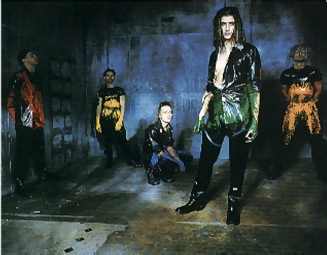 It's this sense of perfection that spills across Jesus Jones' business as a
band and Mike Edwards' business as a human being. The two are inseparable
anyway, to the point where he rarely distinguishes between the two in conversation.
And even when he does make a point of saying "I", or "They"
or indeed "We" (rare), the effect only serves to strengthen the point
that there is no difference! But doubts aside, 'Perverse' is a pop masterpiece.
It swoops from breathtakingly uplifting instances of pop perfection in 'Zeroes
And Ones' and 'Magazine', to achingly melancholic moments in 'Yellow Brown',
'Tongue Tied' and 'Spiral'. There are the traditional Jesus Jones themes of
technological awareness and views of world events, but then there are evocations
of the failings of the self, isolation, doubt... I mean, aren't Jesus Jones
meant to be unfailingly cheerful? If you've ever looked beyond their singles
then you'd know differently. 'Perverse' is, even so, a surprisingly honest and
human album from a band too often seen as clinical techno poptologists.
You want truth? How about "The worst thing about success is that you become
what you detest" from 'The Right Decision'. 'Perverse' is not an album
afraid of, or shackled by, previous success.
It's this sense of perfection that spills across Jesus Jones' business as a
band and Mike Edwards' business as a human being. The two are inseparable
anyway, to the point where he rarely distinguishes between the two in conversation.
And even when he does make a point of saying "I", or "They"
or indeed "We" (rare), the effect only serves to strengthen the point
that there is no difference! But doubts aside, 'Perverse' is a pop masterpiece.
It swoops from breathtakingly uplifting instances of pop perfection in 'Zeroes
And Ones' and 'Magazine', to achingly melancholic moments in 'Yellow Brown',
'Tongue Tied' and 'Spiral'. There are the traditional Jesus Jones themes of
technological awareness and views of world events, but then there are evocations
of the failings of the self, isolation, doubt... I mean, aren't Jesus Jones
meant to be unfailingly cheerful? If you've ever looked beyond their singles
then you'd know differently. 'Perverse' is, even so, a surprisingly honest and
human album from a band too often seen as clinical techno poptologists.
You want truth? How about "The worst thing about success is that you become
what you detest" from 'The Right Decision'. 'Perverse' is not an album
afraid of, or shackled by, previous success.
Edwards started thinking about the follow-up to the multi-million selling 'Doubt'
even before it was cold on the shelves. He could feel success so close that
he could spare no time in constructing the next part of the Jesus Jones world
domination plan.
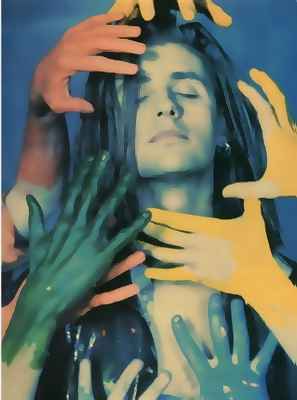 "I
started getting ideas together for 'Perverse' as soon as 'Doubt' was finished,"
he laughs. "'The Right Decision' is the second re-write of a song
that I started writing in the back of the bus when we started touring
Sweden, which was one of the first places we went to in support of 'Doubt'.
I was actually thinking about songs some time ago, although the writing
proper didn't start until this time (November) a year ago."
"I
started getting ideas together for 'Perverse' as soon as 'Doubt' was finished,"
he laughs. "'The Right Decision' is the second re-write of a song
that I started writing in the back of the bus when we started touring
Sweden, which was one of the first places we went to in support of 'Doubt'.
I was actually thinking about songs some time ago, although the writing
proper didn't start until this time (November) a year ago."
A year ago, Mike Edwards informed the world that rock music was well and truly
into its final wailing death throes and that he was the Van Helsing to bang
the final stake into the heart of the long-since fangless rock vampire. Jesus
Jones, he claimed, in particularly grandiose style, were going to make the first
rock album for the Nineties, and would probably knock out the eighth wonder
of the world while they were at it! 'Perverse' was going to be that album. Grand
talk indeed from a 'pop band'!
"I wanted to make a rock album, but a rock album for the Nineties. I wanted
to take all the influences that I had from dance music, I wanted to take all
the techniques, that kind of techno sensibility, and make a rock album that
way. I didn't want any real instruments whatsoever, and I just about achieved
that. The only live performance on the album is my vocal. Everything is played
either through midi guitar or keyboards or through samples, straight into my
computer. The album actually existed on floppy disc for a long time. I would
bring it into the studio and Warne would fire it up and we'd do it that way.
It had to be very technological. But that doesn't mean that it can't
be emotional, because that's one of the biggest things about rock music that
really pisses me off, the fact that it thinks that if something is done on a
machine it can't show emotion, or personality. It's absolute rubbish."
Why do something so technical?
"Because it interested me. That was the most important thing, because
it was a fascinating idea to do an album that way," he explains patiently,
as if trying to explain quantum physics to a baboon. "It's also because
it's what I perceive the times to be about. Everything we do revolves
around computer technology or technology of one sort or another, whether
it be television or computer games, telephones, tape recorders. It seemed
absurd to me that rock music still had this luddite thing about it, you
know, if you don't bang an instrument hard enough it can't be music."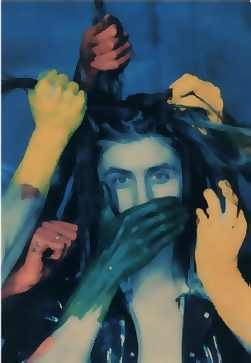
If you can do the whole thing yourself on a computer, why bother getting the
rest of the band in?
"For the sake of extra personality, which can still come through. Jesus
Jones is a band. We do work very well together, especially live. We have
a real chemistry that live, under the right circumstances, can produce magic."
"The album had to be made from the techno point of view, it had to be the
anti-rock album and yet still be a rock album. It had to be sort of contradictory
and a step forward at the same time."
Um... exactly. So what's changed? Well, truth be told, not a lot soundwise.
There's still the ever-present sense of what Edwards calls "the breezy,
easy-going poppy Jesus Jones stuff". Songs like 'Zeroes And Ones', 'Get
A Good Thing' and 'Right Decision' revel in gloriously addictive choruses which
show Edwards at his most poppy and inspired, while at other times you wonder
just what the hell was going on to make him write something as uncharacteristic
and brutal as 'Tongue Tied' or 'Idiot Stare'. He reveals that he didn't have
very much fun writing and recording the album. He puts it down to a lot of different
things: he maintains that he is prone to seasonal depressions, that he couldn't
really come to terms with the previous year and that even after the massive
success of 'Doubt', he had little faith in his own abilities.
"I think that being stuck at home, having spent nine months of that year
going to Tokyo, going to New York, going to... travelling to exotic places or
whatever, and then to be stuck at home sat in a chair trying to write did it.
It became a vicious circle in that I was depressed because I couldn't write
and because I couldn't write I was getting depressed, and it just went round
and round and round."
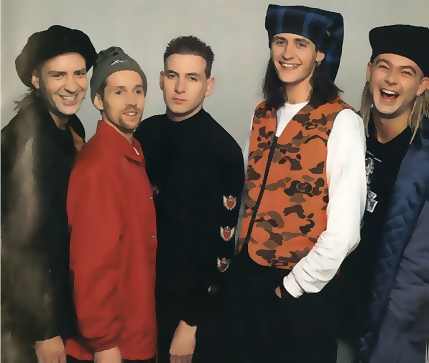 "I
suppose there was pressure from the last record being so successful as
well. In a way it was not believing what had gone on before, thinking
that I'd have to start from scratch again, that what I'd done before wasn't
worthwhile. I put myself into the songs so much on this album that nothing
else around it mattered." Which probably accounts for why much of
'Perverse' has a far darker edge to it than anything Edwards has penned
before, created as it was out of a pervading air of uncertainty. 'Devil',
the first single, may hoik along on a trademark Jesus Jones jingly-jangly
riff, but there's an undercurrent of sadness that creeps around the song's
central theme; that there is no alternative. "And the devil you know,
is the only one," goes the chorus. Says Edwards: "People say
'better the devil you know than the one you don't', but the one you don't
has disapeared. There is very little choice for younger people. It bothers
me a lot that all they know is nostalgia."
"I
suppose there was pressure from the last record being so successful as
well. In a way it was not believing what had gone on before, thinking
that I'd have to start from scratch again, that what I'd done before wasn't
worthwhile. I put myself into the songs so much on this album that nothing
else around it mattered." Which probably accounts for why much of
'Perverse' has a far darker edge to it than anything Edwards has penned
before, created as it was out of a pervading air of uncertainty. 'Devil',
the first single, may hoik along on a trademark Jesus Jones jingly-jangly
riff, but there's an undercurrent of sadness that creeps around the song's
central theme; that there is no alternative. "And the devil you know,
is the only one," goes the chorus. Says Edwards: "People say
'better the devil you know than the one you don't', but the one you don't
has disapeared. There is very little choice for younger people. It bothers
me a lot that all they know is nostalgia."
"After coming back after two years we wanted to make a statement,"
he continues. "'Zeroes And Ones' could have been off of 'Doubt' if it had
had a heavy remix, whereas 'Devil' is nothing like anything off 'Doubt'. It
is a big statement. Hopefully it'll be more than just a statement and
it'll be a song that people really like."
You said earlier in the year that 'Perverse was going to make you the biggest
band in the world. Any regrets on that score?
"Oooh," he cringes, "it's when I hear things like that I understand
why some people think I'm a complete dickhead! I have no idea whatsoever what's
going to happen. It's the beginning of the enormous anxiety phase. I've finished
the album, but there are months to go before it comes out. It bothers me that
I'm particularly happy with this one, because three months after 'Doubt' was
made I wasn't that happy with it and 'Doubt' was enormously successful! I don't
know. I daren't think about it to be honest."
Meanwhile, in the real world, 'Perverse' is as near to a perfect modern pop
album as you're likely to get. Unless you're Mike Edwards you're unlikely to
spot just how wonderfully technical it all is, but you won't miss the strength
and depth of the songs themselves. Why is it called 'Perverse'? Because it's
about twisting people's ideas of what's right and wrong, allowable, sacrosanct
and sanctified. Being techno and rocking out. Perverting accepted notions. It's
about being Jesus Jones. As Mike Edwards makes to leave the room I ask him what
he really wants. "I want," he smiles, summing up what it's all about,
"to have my cake and eat it!"
Interview - Sunday Express - circa January 1993
The large room is discreetly lit, with little pinpoints of
red and green light glowing from the darker recesses. A variety
of hums and drones fills the air, like a chorus of electronic
frogs. All over the floor, in carefully ordered disarray, are
outlandish objects with gleaming edges.
The overall effect is of something ancient and modern, a high-tech
Red Indian burial ground perhaps. Or Darth Vader's playpen.
It comes as quite a shock when a distinctly human voice says
"Hello" and a tall figure unwinds itself from behind
what once might have been an electric organ, but now probably
isn't. He is Mike Edwards, leader and songwriter of Jesus Jones.
The room is a rehearsal studio where the group are readying
themselves for public performance: men and machines in perfect
harmony.
Jesus Jones is a serious proposition for Edwards. The group's
newly released third album, Perverse, has gone straight to number
two in the chart, despite one of the immutable laws of rock
'n' roll: the thrid album is the most difficult, as well as
being the most important.
This stems from the fact that a new group have had their whole
lives to write songs for the first record, and there's usually
enough material left over for the second. It's the third that
separates the wheat from the Bros.
So, how perverse is Perverse?
"Not very by normal standards." shrugs Edwards, "but
by the standards of the rock scene, it's very perverse. At the
moment, you don't have to be very different to go against
the ordinary, to do something unexpected."
"There is so much nostalgia, so much Seventies guitar
rock around, that all you really have to do is be interested
in the now, to say that dance music is the most exciting thing
around."
Jesus Jones' synthesis of rock and dance is not without
friends. Their last album, Doubt, sold two million records and
went to No 1.
Singles like International Bright Young Thing and Right Here
Right Now have rung the bell marked Hit. Jesus Jones are also
one of the very few new British bands to enjoy real success
in the U.S. They are on to something. What is it?
"We've always been putting dance rhythms to rock music,"
says Edwards.
"The whole idea came close to fruition with the Manchester
scene, but all that happened in the end was that the same old
dull indie guitar bands changed their drum beats a little bit."
"They didn't get into the technology side of the music,
which is really where the dance music comes from."
This is all very well, but for those of us brought up to believe
in the purity and sanctity of real musical instruments, the
idea of all this cold technology sends the wrong kind of shivers
up the spine.
Edwards has no time at all for this point of view.
"The old rockist lament that machines have no soul or
feeling is absolute rubbish."
"The idea is set in a bygone age, people are still
thinking of the musical technology that existed 15 or 20 years
ago."
"Remember when the first generation of personal computers
came out - Sinclair Spectrums or whatever they were called -
you could do virtually nothing on them. But in the past 15 years
there have been amazing developments and what you can now do
with personal computers is incredible. Music technology has
come along in the same way."
"The guitar over there," Edwards gestures at some
eerie black object which looks ready to take over the world,
"can play all the equipment you see behind you."
"All those samplers and keyboards, you can play all
of them with that guitar."
"You can now be more expressive through technology
than you can with restrictive equipment like the conventional
guitar, which is just going to give you an ordinary guitar sound."
"With samplers and synthesisers you can make noises like
no one else has ever made."
"However, with all the technology and the winking lights,
there is a human side to Edwards and his band. To see them live
is an experience far removed from a plug meeting a socket. The
fan mail proves that.
Outside this futuristic habitat, he escapes on his mountain
bike or into the back garden which has been concreted over to
form a skateboard bowl. But a traditional ronk 'n' roll lifestyle?
Never!
"I dislike the cliche of the rock imbecile which is encouraged
by the British music press," he says.
The electronic frogs drone on in agreement.


Interview about songwriting - Melody Maker - 30th January 1993
Rather than pretend he enjoys writing lyrics, Mike Edwards prefers to get straight to the point...
"Lyrics are the bane of my existence," he moans. "I love writing music, but it's easily the hardest thing for me when I'm writing a song. A lot of the time I wonder why I spend hours watching all the little details because most of the time I don't think it matters.
"Usually I'll have the song and I'll put the lyric on top. So generally it's a line that deveops into an idea - like we have a song on the new album called 'Hang On Every Word', which I wanted to be about technological jargon. I found that when I had put it into rock 'n' roll speak, it was immensely difficult."
Although he looks up to the likes of Morrissey and Elvis Costello for their lyrical prowess, Mike has problems with "baring his soul" poetically.
"I don't usually express a lot of emotion on our records, and I've been trying to make up for that recently, but it's very hard. At the moment all of our songs seen to be about the modern world around us. Our new songs are about things like computers or magazines."
And while other lyric writers aren't keen to divulge what they consider their best and worst works, Mike is pretty forthcoming with his lyrical peaks and troughs.
"'Right Here Right Now' I think is the best thing I've done so far because it managed to encapsulate a lot about the time and a lot about the attitude of the band - and made it all rhyme as well...mostly. As far as the bad lines are concerned, there are so many to choose from! Huge chunks of 'I'm Burning' make me cringe. But strangely enough, it's the stuff that makes you cringe that makes people write to you telling you how much the song means to them! This is the crux of my problem. As soon as you open yourself up a little bit, people really enjoy it, but I find it really difficult to do."

Review of Perverse - Q Magazine - February 1993
Perverse could be the sound of tomorrow today, if it wasn't so full of yesterdays. Not surprising when the sleeve of Jesus Jones's debut, Liquidizer, proclaimed inspirational connections to The Byrds, Napalm Death, Mel And Kim and Sonny Boy Williamson.
The opening Zeroes And Ones adds a new name to the list when it comes hammering out of the speakers as techno-deadly as a rivet-gun, then delivers a message straight out of Steve Hillage's Motivation Radio, the '70s album that embraced science and all its wonders into cosmic hippydom. Singer-writer Mike Edwards's hymn of praise to digital information storage - "Zeroes and ones will take us there" - declares that "This time the revolution will be computerised".
The first single, The Devil You Know, and Tongue Tied extend the period references, lashing together vicious techno beats with sitar, tablas and even the odd bar of George Harrison-style vindaloo vocal. The electronic sounds are overwhelming, yet it's the moments of contrast with the (sampled) acoustic instruments that make Tongue Tied the most formidable track on the album. "Formidable" is the word, and it's a double-edged compliment, because Perverse has the imposing demeanour of a public monument rather than the backslapping air of a party soundtrack.
Suffused with the impersonal digital aggression of techno, Your Crusade, Spiral, Magazine, Get A Good Thing - most of Perverse in fact - operate at the pain barrier. For many sensibilities the album probably won't amount to a profound art experience because its pain is physical rather than emotional - the aural equivalent of stage lights at epileptic fit-threatening frequencies, a sound so harsh it glares back at you like mirror shades.
A couple of times the structure of a more shapely pop song provides slight easement. Offering quips like "The problem with success is you become what you detest", The Right Decision has a more human face, as does I Don't Believe It (belief, or the lack of it, is the main lyrical theme, echoing the last album, Doubt).
Only Yellow Brown really lets up on the techno-sequencer format. All spacey whispering, wind-chime jangles and eerie harmonies, it explores a metaphor which Edwards says he distilled from a couple of years of globetrotting with the band: the colour, yellow brown, seems to present both the homogenising of humanity and the fug of pollution which blankets the planet.
Even that song has a chilly way with it, though, and that leaves Perverse tough and unwelcoming from first to last. An album of imperious precision, it has absolutely no ambition to charm - just like its predecessor which was admirable, unlovely and bought by two millions hardy souls. Intensely structured, cold, hi-tech savagery could be just the ticket for the times. As summarised by the last track, Idiot Stare, an electronic riff thunderously reminiscent of Led Zeppelin's Achilles Last Stand, the sound of Perverse says, "power is it"
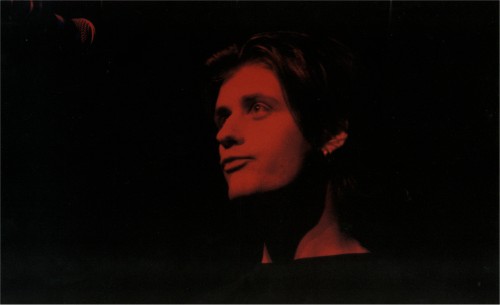
Japanese Magazine Covers - February 1993
The full five page interview from the Crossbeat February magazine can be viewed here. It is a pdf document to preserve the Japanese characters sized at 9.7mB and will open in a new window.




Review of Perverse - Company Magazine - February 1993
Jesus Jones change gear, introducing new sounds to their unique style of music. Since they remixed Bon Jovi's Faith they haven't looked back! This new collection changes tempo from familiar bouncy tunes like Zeros And Ones through to the mellow, methodical Yellow Brown and From Love To War, a sort of techno Pink Floyd track. A brilliant live band who manage to transpose their raw energy into a fine studio cut without compromise. This is a must for fans everywhere and will pull in legions of new followers.

Interview - Jackie - circa February 1993

"We're gonna be the biggest band in the world!"
That's what Mike Edwards thinks about his band Jesus Jones.
Well they're not exactly the biggest band in the world, but
these dishes are the chefs of such tasty technotastic hits that
you can't deny they're one o'Britain's top bands.
And it seems somewhat fitting that their return to the charts
is around the same time as their 'rock' rivals EMF - "I
like EMF," says Michael, knocking on the head all these
rumours that they would bicker 'n' swear at the Forest O'Dean
lads. "I admire the qualities that they have."
In fact, it's difficult to believe that Mike Edwards knows any
swear words. He's so meek 'n' mild and fresh-faced - indeed
hardly a rock 'n' roll demi god at all!
Although he's a 'manly' 26, he looks more like a gawky 17-year-old.
His spot-free complexion, sparklin' peepers and soft locks are
down to his healthy, crunchy wholemeal way of life: he doesn't
smoke, 'hardly' drinks, rides a mountain bike and is v.anti-drugs.
Isn't he great?
But it's not a just Blighty that lurves Jesus! When they chanced
their mitt in the U.S. they went down a storm!
Just like their muckers the 'Mef', their catchy guitar acid
rock and dreadlocked hair whipped the Yanks into a mega million
record buyin' frenzy.
'Right Here Right Now' shot to No.2 (with a bullet!) in the
Billboard Chart, their album 'Doubt' sold over a million and
they won an MTV Award for Best New Artist Video!
"I still can't believe it", says a bemused Mike Edwards.
Their new album 'Perverse' is a bit of a first for British music
- a mixture of techno and rock 'n' roll!
"I wanted to make a rock album but a rock album for the
90s," enthuses Mike. "I wanted to take all the influences
that I had from dance music. I wanted to take the techniques,
that kind of techno sensibility, and make a rock album that
way. I didn't want any real instruments whatsoever! The only
live performance on the album is my vocals. Everything else
is played through Midi guitar or keyboards or through samples,
straight into my computer." (A musical computer,
that is, not a Game Boy!)
"It had to be technological but that doesn't mean that
it can't be emotional. Just because something's done on a machine
doens't mean that it can't show emotion. That's absolute rubbish!"
Talkin' of emotion, Mike gets a little bit emotional talkin'
'bout the business of being in a band, makin' hit records, bein'
interviewed and playin' to the fans.
"I can't wait. I can't wait to get out there. I can't wait
to talk about it. I can't wait to get out there and play. Everything!
I can't wait to be a part of the whole machine again. That's
what i've based my life on really!" warns the serious muso
who eats, drinks and sleeps his 'art'.
Although Mike is the main man - he writes the music, the lyrics
'n' calls the shots, etc - the other band members (Ian Baker
on keyboards, Jerry DeBorg on guitar, Al Jaworski on bass and
Gen on drums) play the instruments obviously which is quite
important, really especially if you're gonna play live!
Fret not, Jesus fans, the album may be a birrova change but
it's truly stupendous 'cos it's still got the Jesus Jones message
about worldly issues and feelings!
So, with dates lined up for the middle of March, Mike'll be
leading his band of merry men back on the road 'n' causin' mayhem
wherever they go, no doubt!
"Jesus Jones is a band. We work very well together
especially live. We have a real chemistry that, live and under
the right circumstances, can produce magic."

Interview - Melody Maker - circa February 1993
"There are three types of talkers - the people who speak before
they think, the people who speak after they think and the people who
think while they're speaking. Mike definately belongs in the latter
category."
Iain Baker, Jesus Jones' keyboard player, tells us this 20 minutes before
we meet Mike.
Mike is a little late, which is most unlike Mike, who is both professional
and polite. Mike looks like he might be even later because he's chosen
to arrive here,a rehearsal studio near Kings Cross, on his mountain
bike.
Mike is very ecoconscious. He has apparently been waylaid by Desert
Strike, a new piece of non-biodegradable computer software that involves
piloting a helicopter into some crazed Arab state and blowing the shit
out of it.
So, in the absence of Mike, we talk to Iain about Mike.
Frankly, we're surprised Iain is here at all. Mike does, after all,
have a reputation for being something of a control freak. In the past
he's been known to tell interviewers that he does everything in Jesus
Jones, up to and including and especially the inerviews.
 In
fact, Mike has occasionally been unkind enough to suggest that the rest
of Jesus Jones are mere lackeys, humble hod-carriers to his sonic architect.
In
fact, Mike has occasionally been unkind enough to suggest that the rest
of Jesus Jones are mere lackeys, humble hod-carriers to his sonic architect.
Then again, maybe Mike didn't mean it. He does, after all, have a reputation
for shooting from the lip. From the very genesis of Jesus Jones, he
has said things that, to this day, make his ears burn.
It's this aptitude for saying things that even he finds embarrassing
that goes some way to explaining Mike's most recent and, even by Mike's
liberal standards, most lofty outbursts to the press.
See, towards the end of last year, while Jesus Jones were in the process
of mixing their third album, "Perverse", some hack or other
asked Mike what it would sound like. And Mike immediately proceeded
to pronounce it The Second Rock Album Of The Nineties. The Other Rock
Album Of The Nineties was, according to Mike, The Young Gods' "TV
Sky". This clearly came as some surprise to those who felt Primal
Scream's "Screamadelica" had been a pretty good rock album.
And that Nirvana, Pearl Jam, R.E.M., Nine Inch Nails, Alice In Chains,
Neil Young and Screaming Trees were doing a more than workmanlike job.
Mike has since done much to justify his claim. He has, for example,
explained that, in the brave new world of Sega and sampling technology,
there is nothing more tedious or reactionary than valve-amps and the
hoary twang of the electric guitar.
Furthermore, he has made it clear that Jesus Jones are no longer a band
in the tedious, reactionary sense but, according to the sleevenotes
of "Perverse", Virtual Players. Which, we think you'll agree,
is far more radical.
He is also now doing all his own interviews with Iain who, as the band's
resident Techno/hardcore expert, is a pretty useful guy to have around,
given that "Perverse" wears its modernity on its sleeve.
When Mike finally arrives he's oddly unassuming. In fact, he is so mild
and magmanimous, he must surely be the shortest six-and-a-half footer
we've ever met.
He sits down next to Iain and eagerly rubs together the palms of his
hands. Edwards, unlike many of his peers, is willing to talk and argue
about any aspect of his band, or, indeed, anything at all.
So we decide to talk and argue about "Perverse" and its questionable
status as The Second Rock Album Of The Nineties.
"We life in a very technological society," he says. "The
phone calls made to arrange this interview, the tubes you used to get
here, even that till over there, all work on computer systems. Technology
is prevalent in every aspect of our society. So why is it that rock
music, which reflected the times in the Sixties and Seventies, has stayed
still while society has moved on? Technology gives musicians so much
opportunity to vary what they do. It's unbelievable and appalling that
they don't use it."
"People say there's something to be said for gritty authenticity,
like MTV Unplugged," Edwards continues, "but there's no longer
anything to be said for it. Where the electrification of the guitar
used to be the best thing to ever happen to music, now it's the sampler.
It's the excitement generated by music that's important, not whether
the musician is a sincere and authentic craftsman."
"And," adds Iain "it's not that by using technology you
lose the warmth and humanity of acoustic instruments, because you don't.
You can still create a warm and human sound. The Youg Gods did it on
the 'L'Eau Rouge' album and the Aphex Twin is doing it now.
"I've been thinking about how Techno could move forward and I think
it will be by expressing emotions and ideas.
There's a track on the album The Aphex Twin put out under the name Caustic
Windows which does that. I'm convinced he's the future of rock music.
I don't think we are/ I wish we were but I think we're just a step into
the future. We're looking for excitement where The Aphex Twin is a true
pioneer in music."
Mike and Iain have this refreshing way of staring at you as they talk.
It's the open, honest look of people who have nothing to hide.
When recording "Perverse", Mike turned every sound into binary
codes (there's even a song called "Zeroes And Ones"), then
fiddled with them until he had achieved a suitably hi-tech noise. Since
this is precisely how The Young Gods recorded "TV Sky" (and,
by the way, how they recorded all their material since 1985, Mike felt
justified in proclaiming "Perverse" The Second Rock Album
Of The Nineties.
Nevertheless, like we say, it is a lofty claim.
"Yes it is," agrees Mike "and I think that's why everyone
hates me so much, because I keep saying things that sound lofty and
grandoise. The thing is, I don't think we're particularly special, we're
not all that good. I don't believe we're as good as the people who influence
us."
"The problem is," Edwards goes on, "we're one of the
very few bands who have these ideas and possibly the only one who can
make them work on a commercial level. The only value Jesus Jones have
in that way is that we're a bridge between now and tomorrow, and when
we go to America we're gonna be challenging all those people who think
there's been nothing new since punk."
"You know," he says, "the best thing that could come
from all this is that bands out there say, 'Oh, Jesus Jones are crap,
this is how you do it!' At least then there's some interest, some
effort being made within the arena of music."
So is "Perverse" crap?
Well, strictly speaking, no. There are just too many interesting ideas,
too many new noises for it to be so harshly dismissed.
The problem with "Perverse" is not a paucity of imagination,
but the fact that the most truly imaginative ideas - the laser-sharp
squiggles that introduce "Zeroes And Ones", the acid riffs
that underline "Get A Good Thing" - are just not given free
rein.
Eventually, Mike always succumbs to his own indisputably well-honed
pop sensibility. He can't help it, he has to write songs. More
to the point, he wants you to hear the songs. The ideas become
tantalising, infuriatingly brief asides to a text we're already familiar
with.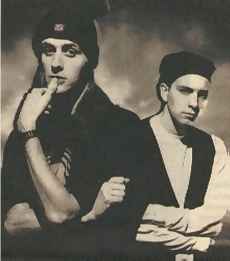
Jesus Jones are a Big Band ("Right Here Right Now" went to
Number Two in America) and Mike wants them to be a whole lot bigger.
So Mike has decided that, to achieve this, he has to write pop songs
- simple, easy-to-understand pop songs.
Compared to The Young Gods, though...
"...we don't make particularly left-field music," says Iain,
who saw that one coming. "Compared to them, that's true. But I
don't see any reason why you can't make music for the Nineties. That
whole ethic where people are deliberately difficult, where they're celebrated
for avoiding success, is a bit disturbing."
Adds Edwards, "People hate me because I say I want to be in the
biggest band in the world and I have had a fair measure of success."
Mike wants to be successful like starving people want to eat. It's pathological.
The band picture on "Perverse" shows him well to the fore,
his head haloed messianically with a huge gold star (presumably the
one he awarded himself for prducing The Second Rock Album Of The Ninieties).
The problem with success, as Mike observes on "Perverse",
is that you become what you detest.
"I got it wrong," he grins. "The problem with success
is you become what the press detests."
"We've never had a problem with success," says Iain. "From
the word go we said we wanted it - for material reasons and because
success includes all the best things about being in a band."
Which are?
"Just think of Slade and the Sweet on 'Top Of The Pops'. They seemed
to encapsulate what fame and success are all about. You become larger-than-life,
you become interesting-looking, you become somebody exciting."
Can't you be exciting without going on 'Top Of The Pops'?
"Yeah, but if you've got ideas you want to reach as many people
as possible."
A psychologist would probably say this need to be noticed illustrates
very deep-rooted insecurities.
"Yeah," agrees Mike, "it does come down to a desire to
be loved."
Most people are happy with a few mates, they don't need transcontinental
adulation.
"But where do you draw the line? Do you complain because only 50,000
people bought your album in Germany, or do you say, 'Christ"
50,000 people"' Really, once you get past 1,000 people and
that's not enough you begin to wander if anything ever will be."
But is this need to be successful really about being loved or does it
just come down to money?
"I've never been interested in money," insists Mike. "I
spent years, literally years on the dole trying to get bands together
and I never worried about money then. Ultimately, if money was important
we wouldn't make such lofty claims."
Perhaps that's why you do make those claims - lofty claims, big press,
extra sales, more money. The bread and the cred.
"No, no," says Iain, "the lofty claims are just a reaction
to the mundane, like that Slacker attitude of, 'Ho hum, here's the record,
see if you like it'."
"And eventually," says Mike, "what would you rather read
about? Someone dull or someone who upsets you and fires you up? I mean,
it's not as if we're courting outrage for outrage's sake, like Madonna
or the Manic Street Preachers. We're passionate about what we do and
we say what we believe. I can't say "Perverse" is just
an alright album because it's not, it's more than that."
But will you, a year of two from now, feel embarrassed by the claims
you've made for it?
"Oh, totally," says Iain.
"I hope to, yeah," says Mike. "That's part of what we're
about, being contemporary. If we didn't say these things, if we just
said, 'Oh, this is our third album, it's okay', we'd have nothing to
run away from, no reason to really try. It's a great spur to us that
we're constantly haunted by our immediate past. From a creative point
of view it's the best position an artist could be in. You're only as
good as you last embarrassing record."
This last statement is typical of Mike, who is able to lose even the
most experienced hack in a labyrinth of self-praise, self-deprecation
and contradiction.
However, Jesus Jones' biggest contradiction is the one that lies between
Mike Edwards' artistic ambitions and his ambitions towards superstardom.
The fact that The Young Gods, Skinny Puppy, LFO et al can do
what they do because, having never enjoyed mass adulation, they're not
compromised by fears of failure.
Mike Edwards, on the other hand, has tasted success big time and discovered,
as he readily admits, that his appetite is insatiable. Failure for him
is unthinkable.
The most perverse thing about "Perverse" is that, although
it's far and away the best Jesus Jones album, although it boasts a veritable
cornucopia of good, sometimes great ideas, ultimately it chooses to
ingratiate itself with the public. Almost all the public.
"Sure there are contradictions," says Mike. "That idea
of us talking about one kind of music and playing another makes total
sense. We're all about contradictions and, if you're true to life, you
have to be. We're not a rock band,we're not a dance band. We're interested
in some aspects of success but not others. It doesn't make us unique
but the fact that we're aware of it all sets us apart because other
bands just say, 'This is what it's like, there are no contradictions'.
And ultimately we'll be praised or damned for that. And that's it."
He's right. That is it.
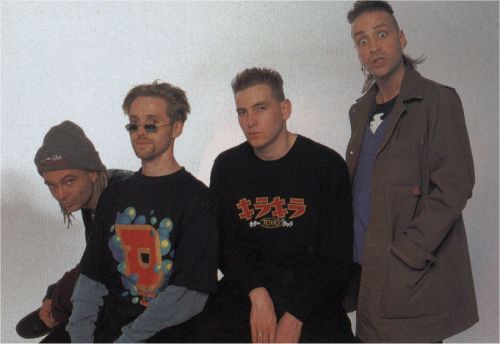
Interview - Making Music Magazine - March 1993
Interviewed by Jon Lewin.

Exactly
how big are Jesus Jones? They've sold over a million records in North
America, they outsell Simply Red in Japan, they've nearly gone gold
in Australia and NZ, and in Brazil they're treated as if they were The
Beatles. Meanwhile in the UK, the first single from their third album
peaked at number 10 in the charts this January...
Although it all seems to have happened so quickly, it's actually been
four years since Jesus Jones emerged as the self-proclaimed saviours
of modern rock music. Since their 1989 debut single, "Info Freako"
(recorded for £125), Jesus Jones have striven to marry the excitement
of guitar-driven pop with the edginess and experimentation of the new
sample-based dance music. And now they've got a third album, 'Perverse',
to prove it.
Jesus Jones' guiding light is Mike Edwards. He writes the songs, plays
the guitar, sings, and does the interviews - Jesus Jones is very definately
his idea. But he's quick to deny any notion that the other members of
Jesus Jones are just hired hands, with a similar sort of temporary relationship
as Matt Johnson and The The. "We're more of a group than The The.
For some people who see us live first, it comes as a surprise to find
there's this emphasis on me, because live, it's obvious we are a band.
The most important thing is something that the press will never see,
which is that Jesus Jones is a personal thing between the five of us.
One of the things about Jesus Jones, why it is a band, is that it's
my four best friends."
"The way the band works - exactly - is I write completed versions
of songs, I do demos complete in pretty much every aspect, send them
out to the band, and then they interpret then in their own unique way.
The songs would be different without the others , definately. But on
this album, I made a deliberate attempt to write whatever the music
needed, and bugger what we had to do live. I remember writing "Who?
Where? Why?" on the last album, thinking, damn, there's two guitarists,
I've got to put a second guitar part in there. That becomes limiting,
so on this record, I took a linear, very fascistic approach: 'this is
the song, nothing else matters'. There were songs on the album where
members of the band didn't play."
Mike claims that playing live is "a good 40 per cent" of what
Jesus Jones is about, and he maintains a passionate, almost sentimental
regard for the traditional rock'n'roll virtues of touring and gigging.
"To me, it was always what being in a rock band was about. That's
where the songs stop being blueprints and start being living things,"
he says. "I absolutely love it. For me being in a band was always
about playing music in front of audiences, the whole tour bus/hotel
thing. I haven't been disappointed. It is as glamorous as I hoped."
This conventional attitude doesn't really tally with Jesus Jones' hi-tech
image, and their 'rock is dead' avowals of the last four years. Mike's
happy to clarify the point. "My point is that rock music, in its
conventional line-up - the Merseybeat two guitars, bass, drums legacy
- is creatively dead. There's nothing happening there. But there isn't
anything wrong with standard pop structures, which are still a great
formula. My overall ambition would be to write great pop songs that
didn't adhere to that standard pop formula. But that takes an incredible
talent to do that," he adds, implying that he still has a way to
go.
Mike Edwards appears to be that rare thing, a rock'n'roll theoretician
- somebody who's actually willing to think about the music they're making.
"A theoretician? Absolutely," he exclaims. "That's why
rock music is mostly dull - people don't really have ideas about it.
I'm not arguing against an amotional approach - Jesus Jones makes fairly
basic music, it isn't clever in any way - but once the music works on
a basic level, then there should be other ideas going on around it."
For a man/band so committed to making different, original music ("Yes,
Yes, and thrice yes"), seemingly pickled in indie spirit, it's
perhaps surprising that Jesus Jones are happily signed, via Food Records
to the extremely major label EMI. While Mike professes respect for independent
labels, he argues that for anyone intent on "massive success everywhere",
indies simply don't have the international depth. "They don't have
the contacts in Buenos Aires, they don't have the people to meet you
at the airport in Auckland, New Zealand. Those things are important.
I have no problems about being distributed by a major label - the sounds
you put on the record aren't influenced by who you're signed to."
However, Mike realises that Jesus Jones might represent a special case.
"Our greatest fortune was that from the word 'go', we had a degree
of success which was encouraging to the record company. Because we did
things our own way and it worked, we were encouraged to go on doing
things our own way. And success becomes a platform you can work from
- any ideas you want to broadcast are heard by more people. We played
to 70,000 people at Wembley when we supported INXS..."
So do you take yourself seriously as a big star, then? Mike laughs dismissively.
"It is ridiculous to see people in the process of deifying you."
Then he makes a cogent point. "But you can't stand in front of
200 screaming people and say ' no, stop, you've got it all wrong, I'm
not really that good.' You just have to run like hell and try and take
as much of your hair with you as you can. But we've never had a problem
with success. In music, if you have success you can take risks - that's
the great lesson of The Beatles. You're paid to be contrary and individualistic,
and entertain people with your unusual thoughts and however they're
expressed." He shakes his head and grins at his own bombast. "I
wonder how that'll look in print?"
Mike Edwards' theorising even extended to the making of Jesus Jones'
new LP, which was recorded almost entirely on computer at Mike's north
London home. "We did it in a classic techno way. I have an Atari
and Cubase. I'd write all the songs on it, and the rest of the band
would come in and play all their parts into the computer, using MIDI
guitars and drum pads."
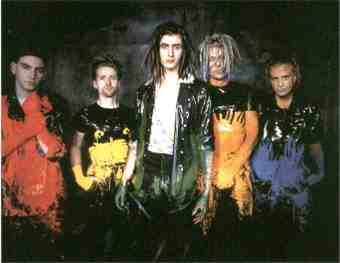 "I
perceive techno as the most progressive and creative form of popular
music at the moment, that will help rock music out of its creative doldrums.
What I wanted to do was use the techniques, the attitudes of techno,
but to make a rock album. I did it partly as a concept, and because
I thought making a rock album that way would work. Ultimately it made
things more interesting for me as a writer, mostly because of the degree
of editability at every stage of what you do - notes, timing, sounds
- as long as the data exists, it's all changeable."
"I
perceive techno as the most progressive and creative form of popular
music at the moment, that will help rock music out of its creative doldrums.
What I wanted to do was use the techniques, the attitudes of techno,
but to make a rock album. I did it partly as a concept, and because
I thought making a rock album that way would work. Ultimately it made
things more interesting for me as a writer, mostly because of the degree
of editability at every stage of what you do - notes, timing, sounds
- as long as the data exists, it's all changeable."
Although he's a guitar player of 15 years standing, Mike wrote almost
all of the new LP on keyboards. He says because he knows the guitar
so well, it keeps leading him back to the same riffs and chords. But
as a two-fingered "keyboard idiot", Mike found himself continually
discovering new harmonies and intervals. Many of the songs started as
15 second sketches written in hotel bedrooms on Jesus Jones' last tour,
using a Roland W30 workstation. "That's my sketch pad. It's much
easier to get the techno Jesus Jones sound going on a keyboard."
Mike uses two main songwriting methods; the first he describes as "the
collade effect" - "Devil You Know" is a classic example
of this. Get a sample you really like, a musical phrase or just one
sound you can make into a musical phrase. Make it do something you enjoy,
then add an extra insturment on top, something that sets off the adrenalin,
and then just keep collaging until at some point you think 'structure'..."
Mike's other songwriting method he likens to wax-loss casting (cire
perdu), where a sculptor's original wax model melts away in the casting
process to leave a perfect mould. Simply, he works up a version of a
piece of music he likes, then builds his own song on top of that. Still,
he's not telling who his models are. "I'm getting very paranoid,"
he admits. "There is a witch hunt on about sampling in America
at the moment - our American record company wanted us to take the word
'sampling' out of our press release, they're that scared. But I do feel
vulnerable, because we say how much we like sampling, how important
it is, what a wonderful insturment it is."
Having said that, Mike Edwards states his current favourite machine
is a synthesiser, not a sampler. "Every album we do has a new toy
which shapes the record. Last time, it was a Juno 60; this time it was
the Roland JD-800. The fashion when I started writing this album a year
ago was for these big buzzy synths, basically the equivalent of heavy
metal guitars, but more exciting because less cliched. The JD was perfect
for manufacturing hard, unusual sounds. The sounds I made on the JD
are always the ones that our sound guy has to turn down. You can hear
it on "Zeroes And Ones", and on "Magazine" at the
beginning."
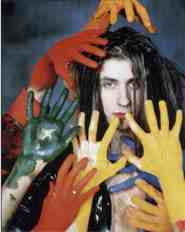 Guitar
parts for 'Perverse' were loaded into the computer using the Roland
GR-50 guitar synth, though Mike's since upgraded to the new GR-1, which
he describes as great improvement - "absolutely fantastic, astonishing"
- over the older model.
Guitar
parts for 'Perverse' were loaded into the computer using the Roland
GR-50 guitar synth, though Mike's since upgraded to the new GR-1, which
he describes as great improvement - "absolutely fantastic, astonishing"
- over the older model.
The result of all this hi-techery,, with the added interweaving of Mike's
textured lead and backing vocals, is Jesus Jones' trademark sound, which
Mike describes as "dense. I like detail, because I like there to
be a tangle of things to look into. And," he frowns, "I have
this fear of simplicity, that the parts on their own aren't strong enough."
According to Mike, lack of confidence is at the heart of the vocal sound.
"In the past, I've never thought I was much of a singer - there
was a version of "Don't Believe It" that started with just
the voice, but I didn't have the confidence for that, indeed I couldn't
remember what key it was in! I'm getting a lot better now, though. Nowadays,
in rehearsal, I often hit the right note. I was very pleased that when
we did Top Of The Pops with live vocals I managed to acquit myself
better than Paul McCartney."
Mike asserts that backing vocals are crucial. "I really like backing
vocals - they add so much to the feel of a song. We tend to treat them
as another instrument to use in the mix."
He accepts the criticism that 'Perverse' is lacking in light and shade.
"I tend to concentrate on one song at a time," he says, "so
I put light and shade within songs. But within the LP I can see it doesn't
make sense."
For all his theorising and willingness to discuss the minutiae of the
musical process, Mike Edwards has few illusions about the significance
of his chosen career. "All art is just trivia raised to the level
of importance, a level it doesn't have in its own right. The important
thing in life is breeding and staying alive. That's why so much music
is made by the middle classes, something the inkies hate - because the
standard of living is so much easier, the time and money exist to undulge
in the less important things in life."
From The Same Interview - Perverse Tales
'Perverse' is Jesus Jones' third album. Compared to their second LP,
the self-produced 'Doubt', which cost in the region of £20,000
to record, 'Perverse' was almost five times as expensive. Two and a
half months in the studio, plus a fee to producer Warne Livesey accounted
for most of that.
With all the instrumental parts already written and sequenced by Mike
Edwards at home on his Cubase set-up, Warne Livesey worked on structures,
editing sounds, putting in subtle wooshes and swishes. "The reason
the album sounds so good is Warne's enormous attention to detail,"
Mike Admits.
The only live performance on 'Perverse' is Mike's singing. "The
most natural thing I do is singing," he says, "I think about
that the least. I complete bits of music first, then I just sing words
and sounds over them. The tune comes first of all, and then the words.
I then struggle with the words afterwards.
"I really dislike cliches. I'm not really a strong enough lyric
wiriter to cut swathe through the pop world, and that really disappoints
me, always has. Words are the hardest thing to do because they're what
everyone relates to first of all.
"This has been the first time I've had a lot of problems with words.
I put it off for so long - I love doing the music and I find that doing
the words becomes almost like work. And then I get miserable when I
get stuck."
Mike's problems with the lyrics, and his subsequent depression eventually
became a source of inspiration for some of the later songs written for
the album...
Zeroes And Ones
"I know I've used that EAB chord progression before, but this is
basically a blues thing, almost... It just sounds the correct thing
to do. And the intro to "Devil" [which has the same chords]
turned out like that by accident."
The Devil You Know
"This was built up from that initial sample - my collage method.
And yes, you probably have heard those descending riffs before - that's
my style."
Get A Good Thing
"This was one of the only tracks written on guitar. We did a couple
of shows in New York, and I saw this Rickenbacker 12-string in a shop
there, got it for an absolute steal, came home and wrote "Get A
Good Thing". It was just chords and a guitar line when we went
into the studio, and I worked on it with Warne."
From Love To War
"You can hear the influence of LFO in those synth bass lines -
their 'Frequencies' was my favourite album of 1991."
Yellow Brown
"There's an extra section - with drums - that was written at Warne's
suggestion. "Yellow Brown" is basically just ACD - "Smoke
On The Water", really - and it was felt that there wasn't enough
of a song there, so I went away and did it in just one evening. I was
very anti-writing at the time, because it was making me so miserable.
This had the working title "Missouri 2" - "Idiot Stare"
is "Missouri 1". They're written with the same samples, but
pitched differently. I was sitting in the hotel room doodling about
2am, and I just played this sound much lower, and it was absolutely
enthralling - so I got two songs out of one sample."
Magazine
"This is the archetypal Jesus Jones song, and no apologies - I'd
been fed up with the writing, so I wanted to do something really simplistic,
really quick. I'm quite pleased with the words in retrospect, but it's
an old style Jesus Jones record for the old style Jesus Jones fans;
bright and flashy and quick. The lyrics are definately about having
a short attention span. I have a very short attention span - as soon
as a song has vocals, it sounds long to me. But I can listen to seven
minutes of techno, no problem. To me, songs age very quickly as soon
as the vocal comes in."
Right Decision
" I worked hard on the chords for this one. What I attempted to
do was write a great single without using the classic format. After
a short while, I realise it has become verse/chorus/verse/chorus, but
it's hidden because the sections are different and the two bridges have
different chords."
Your Crusade
"It starts in the playground, an attempt to repress individuality.
You have to be part of a scene in music... I have a very good idea early
on whether the bit I'm writing is a chorus or a verse. With Cubase you
can just lift whole sections out and move them around - it's a real
aid to songwriters to be able to do that. It's made it easier to write.
You're aware of structure so much more because you can see it on the
screen, staring you in the face that it's going verse chorus verse chorus.
That should help you try to do different things."
I Don't Believe It
"We live in an age of communications, information overload; we
have stereotypes and are very unaware of the amount of propaganda we
take in. The way news is presented, as liberal and independent, is often
questionable. Look hard at what you're being told."
Tongue Tied
"This one started off with a rhythm. Certainly on the first two
albums, I used to do that; this and "Zeroes And Ones" were
the only ones this time. "Tongue Tied" is similar structure
to "Idiot Stare" - you write about not being able to write,
and to make it more interesting, you throw in something completely different.
In "Tongue Tied", the chorus sections are the ones that are
radically diffrent, but in "Idiot Stare", it's the verses.
Spiral
"There's a thematic link between the lyric ideas and the music
- you get these people who are very placid who have these sudden explosions
of violence. That why there's that sharp contrast between the two sections
of the song. The whole point of "Spiral" was that I'd been
listening to a lot of pre-runners of ambient techno, thinking it would
be a nice idea to do something in a very techno way but without the
beat. still have all the really powerful elements without the dictatorial
thing of the beat. It had to have a sinister quality so we recorded
it fast, varispeeded up, so my voice had that low demonic quality."
Idiot Stare
"That bass riff is the easiest thing in the world you can do -
power up your Akai S900 and S950, and use the tone sample that's in
there. That was my lowest point - basically when I can't write I sit
there in my chair for eight hours with this idiot stare on my face thinking
miserable thoughts. I only realised the song sounded like "Kashmir"
much later. The best bit of rock music that I've ever heard in my life
is two of the three songs on the trilogy at the end of 'Daydream Nation'
by Sonic Youth: "The Wander", and then into "Hyperstation".
They get this sense of hectic... of something apocalyptic approaching
by using all these mad guitars, notes that go up and up and up, always
looking forward to something. A fantastic effect, that's what I was
going for. And people ask, did you sample the James Bond Theme?"
Interview - Q Magazine - March 1993

When the lankily youthful figure of Mike Edwards, 28-year-old leader
of Jesus Jones, comes gangling into view, it's not immediately apparent
why he commands such respect. He's polite, he smiles readily and talks
non-stop, stooping - he's 6' 2" - to hear other people's point of
view. Even his clothing suggests ridicule rather than awe. Consider this:
family-sized trousers, luminous camouflage waistcoat and what can only
be described as an amputated coat sleeve. On his head.
Yet Mike Edwards is respected . "You have to be on the ball when
he's around," says an EMI record company executive. "He's incredibly
professional." Indeed, Jesus Jones's career thus far reads like a
text-book example of How To Do It Right. Since their first ear-blistering
demo, Info Freako, made for £125 in late '88 and eventually charting
just outside the Top 40 in February '89, Jesus Jones have made two LPs
- the frenzied Liquidizer and '91's more considered, straight-in-at-Number-1,
Doubt (gold in the UK, platinum in America) - plus a Number 7 UK single
(International Bright Young Thing) and a Number 2 US single (Right Here
Right Now). They've had two Grammy nominations, an MTV video award and
PRS/BMI award for Right Here Right Now, as the song most performed on
US college radio in '91. Live, they are a massive force, car crash and
chainsaw samples hurtling into a wall of shuddering guitars, nasty and
noisy. By anyone's standards, they haven't put a modishly trainer-shod
foot wrong. Edwards has been judge at the last two Q awards, even.
And yet Jesus Jones have never been clasped unto the British music fan's
bosom. They are seen according to Edwards, as a brash, bratty, one-dimensional
band with only one song. Crueller types have ventured the notion that
he's an egocentric spotlight-hogging maniac with delegation problems.
"That's probably the closest to the truth," he acknowledges
breezily. "That's why I'm in a band. My only defence is that I'm
prepared to admit it, which make me radically different from most people,
certainly anyone that comes from an indie or alternative background -
the one where we're supposed to come from, although we always try to distance
ourselves from it. Because we believe in stars you know?"
Without pausing for breath, he continues.
"We're prepared to impress, to take unusual steps, to be fancy-free,
to dress like imbeciles because we enjoy doing so, to be outspoken, to
be opinionated. I often say things which are inaccurate, wrong or downright
stupid. And I'm prepared to do that - although I do try to make everything
that I say something that I believe in. You need people to make outrageous
statements. At the time of punk music, you needed people to say that all
those rock dinosaurs were rubbish and now you need The Shamen to say that
rock music is dead, even though quite clearly they draw a lot of their
influences from rock music. These things have to be said to agitate people.
And I have absolute faith in my perception of music."
Although this reads as plain arrogance, the tone, in the flesh, is merely
confident, driven even, Michael James Edwards has a vision, you see. The
story goes that Edwards , his old school friend, drummer Gen (Simon Matthews),
guitarist Jerry De Borg and bassist Al Jaworski (Alan Doughty) were sitting
on a beach in Spain in the late summer of '88, depresseed, disheartened,
mightily sick of the continual failure, when Edwards turned to his chums
and said, I know how we can succeed. But what you have to do is give me
complete control. "Oh go on then, you skinny git," his faithful
conceded, "see if you can do any better."
Under the new regime, the first thing to go was the name. Farewell Camouflage,
hello Jesus Jones. Info Freako ("squashing Big Black and Public Enemy
together") was recorded a fortnight later.
Iain Baker, who worked in a skateboard shop, joined on keyboard and samplers,
and the newly techno-friendly Jesus Jones were signed to Food records
within weeks. Info Freako (the original demo) reached Number 42 in early
'89. Unusually for that time, Edwards also recorded an acid house-tinged
12-inch dance version, called Info Psycho, one of the first records to
sample the Funky Drummer riff.
Embracing house music was, and is, the key to Jesus Jones. The moment
he purchased a sampler, he recalls, his perimeters suddenly became limitless.
Thus Liquidizer notes, in correct dance music tradition, the bpms of each
track, and lists 38 "influences" (read: samples) spanning Todd
Terry, Sonic Youth, Sonny Boy Williamson and Mel & Kim.
"The explosion of acid house meant something," explains
Edwards. "It hadn't come through the usual paths of the music papers,
it was happening despite that. It was a genuine resurgence of youth culture.
And that was thrilling and it really set us off."
Inevitably, Jesus Jones were lumped in with the emerging indie-dance "manchester"
bands. On their '90 American tour, Iain Baker altered countless posters
reading. "From Manchester...Jesus Jones" to "From Watford..."
Nowadays the group can afford to snigger a little, having watched numerous
unwisely-trousered Mancs come and go as Doubt clocked up its millionth
American sale.
And now there's Perverse, the third instalment of Mike Edwards's vision.
House music is still a major influence - Edwards and Baker go to a techno
club once a week and hardcore runs through much of the LP, most notably
on Zeroes And Ones and Spiral. Jesus Jones, however, are not The Shamen,
and they don't claim to have deserted rock music. Indeed, in Idiot Stare,
Edwards has written his best ever rock song. And there's a Top 10 single,
The Devil You Know and another couple of dead cert scuzz-pop songs (Right
Decision, Magazine) thrown in for good measure.
Whereas Doubt was recorded in seven days, all instruments and vocals laid
down almost entirely by Edwards (with the other band members occasionally
summoned "to save time" as De Borg bitterly claimed at the time),
Perverse took three months. How much the other members were involved is
not clear - the only live performance is the vocals, everything else has
been through the computer mangle - but Edwards is matter-of-fact about
the process. "I write the songs and when they're done, I dish out
cassettes. The A-side is the songs as they are, complete, what the songs
sound like overall; and the B-side is what I refer to as The Idiot Tapes.
They're where, say for Al, there's a tiny little bit of drums and tiny
bits of sample and loads of bass right at the front so you can't mistake
it. And the band learn their bit and then come in. That's why the records
often sound a little stiff, because people are still trying to get their
parts right."
It's a trademark of Jesus Jones records, that stiffness, a lack of warmth.
Edwards writes of modern culture in his lyrics, of computers and war,
but nothing seems especially personal. On Perverse, only Idiot Stare seems
to skirt anywhere near his soul.
"I'm crushed," he says, and he's serious. "What a terrible
failure I've been. Wow. Shit. What a pity. Because I tried very hard on
this album. I think that there are elements of my personality there."
He recovers and carries on. "But I am a little wary of the Roger
Waters school of writing. I mean I don't think I'm interesting enough
for anyone to listen to me talking about myself on a record."
"Mike would like to think he's giving away a lot in his songs,"
said Iain Baker in '91, "but I don't think some of the deepest things
he feels will ever come out...there's no humanity in what he does."
Andy Ross, joint owner and head of A & R at Food Records, has a theory
about his most successful charge: "Mike is a bit of a perfectionist
and sometimes can give the impression that he's something of an automaton.
He uses Food as a sounding board, and our main role is to help him iron
out any wrinkles or uncertainties, so that by the time he actually bares
his soul to the world, things are resolved to his satisfaction. He comes
across as thoroughly professional and confident because of this, but he's
by no means a mechanical robot. Quite the reverse. He's actually rather
sensitive. That's why he covers all the bases."
And that's why the others let Mike Edwards get on with it - because they
know that he's the only one with the patience and the standards to get
the records right. That's why everyone in EMI stands just a little straighter
when he walks in the room. That's why he can conclude his interviews with
a cheery "See you next album", confident in the knowledge that
he probably will. And that's why he's just a little bit unnerving.

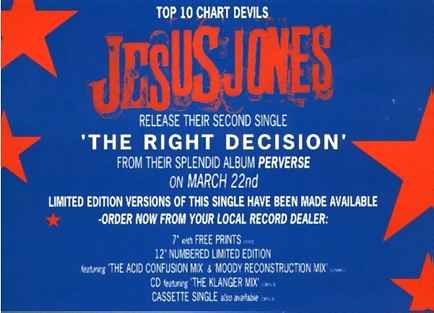
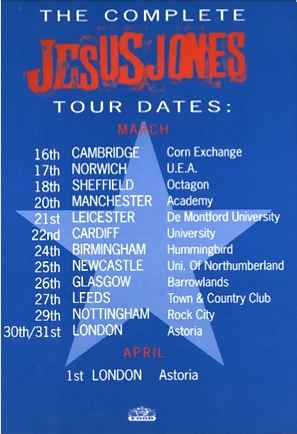
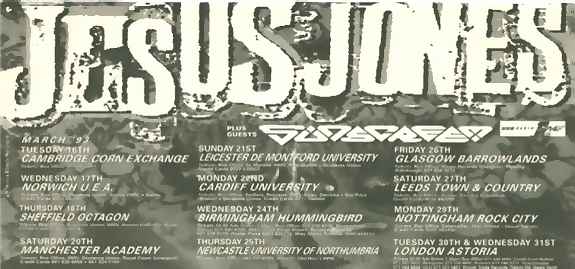
Interview with Mike Edwards - Graham Reid (Elsewhere) - 24th March 1993
Elsewhere by Graham Reid music - travel - arts - Wide angle reviews, interviews and opinion by writer Graham Reid
Mike Edwards has got a big mouth - and without going too far into the anatomically impossible, it’s his big mouth that gets right up people’s noses. And right here, right now in Birmingham, he’s been getting up the noses of the British music press - which admittedly isn’t hard to do and probably quite worthwhile. A quick glance at the British music papers recently can be a distressing experience, especially if, like Edwards, you believe the best way to move on is to go forward. It‘s all back to the future with Sixties and Seventies-sounding bands in Carnaby St gear.
"Yanks Go Home!" said a Select cover story recently acclaiming the greatness of British rock . . . and chatted with retro acts like St Etienne, Denim and, of course, Suede.
Into this atmosphere Jesus Jones have just released their third album, Perverse, a shift away from the flashy aggro-pop of their previous Liquidiser and Doubt albums and a full embrace of techno. As Edwards sneers through the static-crackling rock of Zeroes and Clues. which opens Perverse, “this time the revolution will be computerised.” But not yet, Mike. The very day he is speaking, the British charts have come out: Coverdale Page are at one and behind them are Lenny Kravitz, Eric Clapton's Unplugged . . . and Pink Floyd’s 20-year-old Dark Side of the Moon. Are these the international bright young things of the 90s?
“Pseudo-young music made by pseudo-young people,” Edwards says, dismissing Coverdale Page and Kravitz in a well-rehearsed phrase. “And these cabaret-impression Seventies bands on the covers of the British music press ... it’s just people reliving their childhoods.” And there go Suede, the Auteurs, and all the rest of them. When Edwards gets so openly dismissive you know there's a backlash coming. Reviewing a Jesus Jones show in Norwich, someone called Zane in Melody Maker opens with “Arrogance, assumption, haughtiness, insolent bearing. Ring any bells, Mike?" Others are grudging in their praise: “Mike Edwards has always irritated the fuck out of me -- that smug, know-it-all grin. But I have to concede that he’s a smart cookie,” wrote Simon Reynolds reviewing Perverse. And there's the rub. Edwards gets up noses but - and because, perhaps - he’s right.
"Oh, there’s been a lot of personal attacks on me,” he says cheerily with that grin. “The most common thing is the misquoting of my statement that ‘Perverse is the second rock album of the Nineties,‘ which variously comes out as ‘the first great rock album of the Nineties' or ‘the third great rock album'. No one has managed to get the number right yet. “That‘s not me blowing my own trumpet. What I'm saying is, for us to make an album that reflects the society we‘re living in we use computer technology. That’s a very natural thing to do - why isn’t everyone? “Why is it the retro stuff is getting the front covers when new music is what it’s supposed to be about? I’ just trying to draw attention to the fact nothing is going on - and everybody knows it.”
It’s a raw, late March night in Birmingham and at couple of hours before he takes the stage at the nearby Hummingbird, Edwards is wired up. “Touring certainly shapes the way you look at music and playing the new songs at people I've got a lot more indignation and anger. I actually don't mind talking about the music non-stop and doing promotion because we do have ideas . . . although around the world - and particularly here in England - it hasn’t actually worked to our benefit that we’ve got things to say about rock music. “At the moment a great deal of people who are commenting on rock don’t want anything new, as evidenced by the dire situation of the Grammy Awards in America. How can Eric Clapton win all those? “lt's just as bad at the Brit Awards - some guy stands up and says, ‘We’re here to prove English rock music has got something new and it’s not dull and boring.’ And the first band he introduces is Madness playing a 10-year old hit. I ask you!" he snorts. Yes Mike, but those awards have never acknowledged cutting edge music. Go back 10 or 20 years and see who was getting them then. “Of course, it was all the safe, boring stuff but it was the safe boring stuff of its time. And the British music press offer equally dire options. People making the music, commenting on it and presenting it are simply not interested in anything new," he announces with the triumphant and uncompromising finality of a man whose big brother has just arrived and he's bigger than your big brother.
And that's what Edwards is all about . . . This is the Nineties, let’s get it on using Nineties technology. Sample and hold. Techno is it; boys with Hunky Dory or Aladdin Sane albums and an attitude aren’t. As Edwards says, “The future is here; you can only deny it for so long.” As he sits courting and confronting the press yet again, you can’t help-but admire Edwards. He is smart, articulate and despite the confrontational attitude with the media - which guarantees coverage, at the very least - he’s a professional, knows whose hand to shake, and has a canny sense of what the fickle pop industry is all about. And if that weren’t bad enough, he's good at what he does. Later that night and it’s looking like a full house at the Hummingbird - a cavernous venue which is like the mutant offspring of the Powerstation and the Logan Campbell Centre. Big, accommodating and with great sound. The same week as Jesus Jones hit the Hummingbird, Newcastle, Glasgow, Leeds and all points elsewhere around the United Kingdom, the Wire magazine is carrying yet another essay -- this time by fortysomething American critic Greil Marcus -- about whether rock is dead or not. Well, Greil, tell it to the kids.
The Hummingbird is humming and by the time Sunscreem finish their laser-blazing mind-boggling techno set, the mood is one of edgy anticipation. After half and hour of ambient techno, Jesus Jones take the stage in a blitzkrieg of hard-edged techno-rock. Drum machines chatter, synths stammer, Edwards' mouth yawps and gapes at the microphone and guitarist Iain Baker swirls off to the right in a kaleidoscope of sound and light. The indecipherable chat of Brummie kids ("ee, choot. eaz ee greet lud that ’un thair”) is silenced and the pogoing and slamming starts in earnest. Unlike their previous albums, Perverse hasn’t sprung the immediate pop hits, so Edwards, canny chap that he is, leads his young audience into the new material carefully. For those of you who liked the earlier things, he says at one point, you might like this, and it’s off into Magazine from the new album. The long but snappy set flicks back and forth between old and new material as the band delivers songs like Right Here Right Now and international Bright Young Things with the same sense of commitment as the new songs. It’s a sonic blast -- and seems to capture the mood of young Birmingham. The fact is -- critics from the Wire notwithstanding -- rock is alive on this night and its name is techno. Every second Friday the Hummingbird offers "Music for the Hi-Tech Low Life” in an industrial/cyber/techno club night. Sheep on Drugs are picking up an audience, Sunscreem pours out of fashionable clothes shops on Oxford St and the Aphex Twin album went top 20 on the indie charts. It is the trickledown from Acid House from kids in the suburbs with drum machines, eight-tracks and the numbing side-effects of Thatcher’s regime. Bored? Tune in, turn on and drop it on someone else. While techno of the Snap/Technotronic and 808 State/Adamski kind may have a facelessness and anonymity about it, Edwards advances another definition. lt’s all down to the equipment, not the product. The main difference between the way Jesus Jones and the Black Crowes made their albums is that the Joneses did theirs on computer and stored it on floppy disks and the Crowes did theirs on tape.
“It’s a difference in method rather than performance. The fact we use samplers, drum machines and so on doesn’t detract from the human part. People -- us -- are still programming it and we’re still playing guitars on the album. It’s human -- there isn’t any music that isn’t. Even Kraftwerk.” Whatever Jesus Jones are influenced by, it is up to the moment and on the edge. “The best artists work the line in the middle between blatant disregard for cormmerciality and having a good way with a pop song," he says flatly. Sound like anybody we know? Except Perverse hasn’t quite managed that . . . yet? “I did take it to heart when people said there weren’t as many pop singles [on Perverse] as before, because there is no higher art than writing a pop single, as evidenced by the fact so few people can do it. It’s very easy to make avant-garde or alternative music, but to make music that is hugely successful does require a talent.”“On Doubt there was a lot of instantly accessible pop because at that time that was one of the things that was directing pop -- it had an instant accessibility. In 1993 that won’t wash any more. "I can't think of anyone releasing an album this year, however, that I am looking forward to hearing. Depeche Mode maybe. But if I'm asked what I’m listening to or who I’m influenced by, it would be a whole lot of currently obscure techno musicians, like the Aphex Twin. “I’ve never liked any comparisons between us and anyone else, and our first single -- which mixed dance and rock, I might add -- got attention in New Zealand a year before the Manchester scene which we somehow became associated with. Odd, since we were from London. “It was very uncomfortable for us when Manchester broke, because suddenly there were loads of bands whose fashion veered alarmingly close in our direction. They've veered away now – those that are left -- but we were running parallel for a short while and there were factors which were similar. “On the first album the media references to us were all Pop Will Eat Itself and Big Audio Dynamite; for the second it was all Happy Mondays and Stone Roses. Perverse is the first album we haven't had all sorts of comparisons to come through, although someone called Depeche Zeppelin which is my favourite description so far. “But actually it's got everyone stumped,” he announces triumphantly.
What Perverse and Jesus Jones are now offering may then be less an album of immediacy and pop credentials than a blueprint – Perverse being the second rock album of the Nineties. The music is enhanced by samples or uses them as a starting point. “The Devil You Know is an example of where a sample starts the songs: at the beginning is a very high-pitched Iranian instrument. I really liked that, so then I started collaging sounds on top to get more of a mood. Once that starts, then you work with the structure of it as a song. “But the technological aspects aside, songs come in the way they do for anybody. Yellow Brown, for example, is a result of travelling around the world and then saying, ‘Right, you‘ve been everywhere, what have you seen?’ It may seem very negative, but the one constant was pollution. It didn’t matter where it was, there was always this yellow brown hanging in the air. “And funnily enough I find it easy to write on the road because you’re travelling, seeing something new – and that can put you in a very excited state. It’s a thrilling life to lead and it’s also an opportunity to read new books and listen to new records. “It’s unfortunate that the only time being on the road is written about is by cliched heavy metal bands who have a stylistically incorrect version of what it’s like. Touring is getting off the plane in a country you’ve never been before and being excited about the sights and music. “Hip hop and the fat backbeats speaks to America but when I come back to London it’s not relevant. Techno says something about what it’s like being young and in London . . . or Birmingham. “So Jesus Jones’ music reflects that and what’s happening now. And the idea of the song is still central, it’s just all in the making of it.” The problem now is that the so-called "traditional way" of making music in a studio with guitars and tape recorders is outmoded. “That inadvertent statement, the second rock album of the Nineties, isn’t understood by people because they don't understand the whole recording process – but that’s not my problem. “In that regard, Perverse is unusual by default. I can’t understand why rock bands -- and rock as such -- isn’t going in a similar direction or the music isn’t all being made in this way. “We know techno people and if you say, ‘We’ve recorded Perverse all on computers' they'll say, ‘Yeah, so? Doesn’t everybody?' “I don't understand why rock music has this thing about 'after '76 or ’79 nothing good ever happened.' It’s all so decidedly backward-looking and for me it is the majority of rock music that is strange and unnatural in the way it is so retrogressive." And getting more retro by the day, too, Mike. Within the month, Suede's album was out. It debuted at number one and a week later Bowie’s look over his shoulder, Black Tie White Noise, was behind it at number two.
Review of UEA, Norwich gig - Melody Maker - 27th March 1993
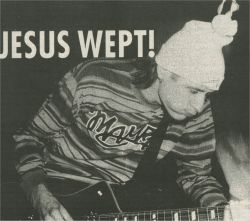
Arrogance: Assumption, haughtiness, insolent bearing. Ring any bells, Mike?
Okay, the crowd are as enthusiastic as a drugged elephant, the lighting rig looks like it's on loan from "The Muppets" and we're in f***ing Norwich, for chrissakes. But does that really justify Mr Edwards' first words to his paying audience? "What are you lot doing here, you know you're not supposed to like us?" It's not even said with the slightest bit of irony, just growled at the crowd in a contemptuous snarl.
Later on, he takes the piss out of NME's front cover coupling of Bowie and Brett, and makes numerous references to "bloody journalists". Don't get me worng, Mike doesn't offend my scribe sensibilities, it's just that you don't expect someone who's had numerous transatlantic smasheroonies to come on like some embittered old tosser at a bus stop.
Not content with spitting his pearls of wisdom at us, Mike has decided that we're not allowed to have a proper knees-up. He's cunningly arranged the running order of the songs in a foxtrot: slow, slow, quick quick, slow. The idea behind this atrocious decision is, no doubt, that we LISTEN to the nice new songs from the "Perverse" album, that we appreciate and understand them.
Due to this error of judgement, "Tongue Tied" and Magazine" have the combined effect of starting a stampede for the bar.
Sure, the band shake their hair and make spastic poses, while the computers fizz and whir. But something is definately amiss. Could it be that the new songs are too slow to be techno and too fast to be ambient? No. The reason this gig is falling flat on its face is because Mike, the prannet, has the vocals so overpoweringly high in the mix that the rest of the band are no more than a distant blur. No wonder Norwich is gripped with an ever-increasing narcolepsy, the rhythm section is quieter than a nun's fart.
Old faves like "Real Real Real" and "International Bright Young Thing" hobble when they shouuld leap in the air. "Who? Where? Why?" miserably fails in its quest to be a revolutionary marriage of digital-dance and boiling rock. And "The Devil You Know" simply shimmies by with only Edwards' hoarse, questioning voice to identify it.
However, and it's a big however, there are tracks that no amount of whining cynicism or petty egomania from Edwards can ruin. The encore of "Infor Freako" and "Idiot Stare" shine like pearls in pigshit. At last, the Jeuss Jones of yesteryear emerge from their studio-dusty shrouds. Finally, the band that had me dancing 'til asphyxiation at the T&C in 1989 have appeard in all their aggressive, eager, fiery glory. If only this had happened an hour and a half ago. If only these weren't the very last songs in the set. If only...
Mike Edwards, you're a foolish man.
All you have to do is practice the simple art of affable communication or, at a push, just pretend you like the people that pay your wages.
Otherwise, Jesus Jones can forget about a second coming.
Interview with Mike Edwards - B Side Magazine (USA) - April/May 1993
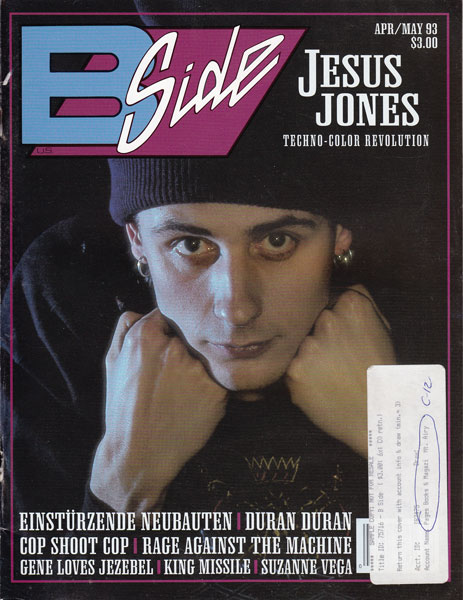 Mike Edwards strides down the hall at the EMI offices, coming to an abrupt halt ten feet behind my kneeling photographer. She's busy inspecting her light meter, waiting for Mike to return from his break in getting immortalized. Whatever is he doing back there?
Mike Edwards strides down the hall at the EMI offices, coming to an abrupt halt ten feet behind my kneeling photographer. She's busy inspecting her light meter, waiting for Mike to return from his break in getting immortalized. Whatever is he doing back there?
He suddenly breaks into a fast sprint, springing over her head with legs spread wide, landing squarely before her. A definite ten! All I can think is if she had chosen that second to stand up Mike would be doing our interview in a funny highpitched voice.
We had just finished a hushed discussion sussing out whether Mike is coherent enough to do an interview since it is almost ten at night and he's been doing continuous promo for the last two days.. He thought he was coming to New York only for MTV and a little radio promo... surprise! But that entertaining stunt seals his doom: the tall dude is mine tonight. I don't care if the whole day is running hours late and he was subjected to "120 Minutes" earlier... no mercy!
There won't be any problem because Mike's a charming professional. That's not a dirty word for those of you who like your artists out of touch with reality. Jesus Jones wants to sell records. Jesus Jones also makes fascinating records to sell. It works out quite nicely, don't you think? Mr Edwards appreciates his audience enough not to feed them drivel, and with Perverse, Jesus Jones' third bristly baby, Mike and company have come up with a techno influenced dynamo that has critical opinion from Rolling Stones to Time claiming it's their best yet. Those critics are right for once.
Mike makes a face, admitting, "I have been, for months, trying to think my way around the cliche term 'this is our best album yet.' Everyone's going to read that and go yeah of course. What an original thought that is," he mocks. "But I listened to this album four months after I made it, and it sounds better than it did then. Four months after both Liquidizer and Doubt I couldn't listen to them at all. They went off the moment they were completed. And that is worrying because if I react against what has gone before, how am I going to react against this after enjoying it so? And I'm starting to think perhaps if this album does do really well we should get them to engineer the plane crash to assure legendhood."
He pauses, musing, "Ahhh, I don't know, perhaps not a plane, I don't want to go in a place crash. But perhaps a John Lennon type of assassination, on the street."
I can hear the shrieks of sacrilege now. Mike, there's always the tragic boat accident... "That sounds horrible!" he exclaims.
Wait, it could all be a scam and Jesus Jones could be found alive twenty years later living on an island. "Yes! We could become one of those Australian cover bands! Who could we cover?"
You could always do a Human League cover tune.
"Meeooeow!" he laughs. "Yeah, if we needed a hit very badly!"
If you're that desperate! He leans in to speak directly into the microphone. "Mike says nothing."
I know, I said it all! Believe me, that's the last time tonight Mike will say nothing. He has plenty to say about Perverse, and he's happy so many people want to listen.
"I'm grateful for it, because people are falling over themselves to have something to do with Jesus Jones. There was a lot of time involved in making this album, and since it's been finished, and I thought 'oh my God, no one's going to be interested any more.'" he gives a smile, admitting, "That might sound patronizing, but... I am not expecting anything. I'm not taking anything for granted.
"That seems to be the way it is all over the world, even in our great bug bear, which is Europe. As far as the Europeans are concerned, Perverse is our first album. In places like Italy it's still 'well, here we go again, how did you get the name, how did you guys get together..."
The type of questions that drive any sane artist to become a bloody axe murder.
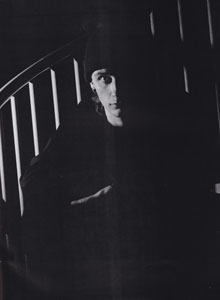 Mike gives me a startled look until what I said sinks in. He then gives one of his evil grins, merrily exclaiming, "Yeah! Sometimes I have nearly turned into one when faced with questions like that. We would like to think that this album has more depth than before and it brings about this level of increased interest. Although I could be just fucking myself and you could be flattering me as well."
Mike gives me a startled look until what I said sinks in. He then gives one of his evil grins, merrily exclaiming, "Yeah! Sometimes I have nearly turned into one when faced with questions like that. We would like to think that this album has more depth than before and it brings about this level of increased interest. Although I could be just fucking myself and you could be flattering me as well."
I am not known for my flattery. I enjoyed most of Doubt, but I frankly was very nervous about what direction the group would travel in. When I got the advance I wouldn't go near it for two terror filled days. Just in case it was a full-blown pop horror? Were you afraid that it was going to be an ultra pop album? Is that what you were dreading, an album of 'Real, Real, Real?'" he questions bluntly.
Exactly! Jesus Jones was at the edge and I would have been totally disappointed to hear a pop orientated album. Granted, it would have been a great album, but innovation is demanded from our merry musical pirates. Now I don't even have to ask what the major differences are between Doubt and Perverse, as it's blatantly obvious it's the new found depth of the music and the aggressively pointed, even snide lyrics.
Mike touches back on his reaction theme. "I try to write in a reactionary way. Doubt was a reaction to Liquidizer. Liquidizer was very one dimensional, very deliberately so, it plowed a particular furrow," he jests, "and that was part of its job. With Doubt we tried to be eclectic, we tried to show there were different sides to us, even by calling it Doubt, just trying to get over that one dimensional super confidence thing we have. And we always have the bright shiny pop single in there. I still believe in that, but when I was writing Perverse, subconsciously I tried to steer clear. It's funny, because you do see bands who react so strongly against pop success. They shoot themselves in the foot, and they go to the opposite extreme.
"The first few interviews that I've done, where people have said this album is a lot heavier, it doesn't have the obvious pop single on it; I thought that was a failing of mine as a writer. I don't think that's true; there're songs like 'The Right Decision' which is an out and out pop single, but at the same time we're aiming for this Utopian situation with a song like 'The Devil You Know,' which is one of the best things I've ever written. It's the song that doesn't conform to the standard of what a single is, but you want it to be a hit because it is such a great song."
I'm just nodding like one of those flocked dogs on the dash of a car. Most people don't even think at this brisk a velocity. He finally takes a breath and adopts a theatrical side stance, again lunging towards the microphone. "This is a horrible analogy, and readers, forgive me for this, but it's a bit like 'Bohemian Rhapsody.' I don't like the song, though it is a wonderful song, but nonetheless it broke the norm. It was enjoyable for that, in that it wasn't two minutes and 45 seconds long going from chorus verse to chorus verse."
That's another amusing game one plays when that advance arrives: pick the single. 'Right Decision' was too obvious but I still bet on it. "Yeah, I think in a way because it was the obvious one that's why we avoided it. If it was 'The Right Decision'" he winks, "then we would have made no statement from Jesus Jones."
Mike is stunned that the record company is looking towards 'Idiot's Stare' as the possible next single, as he feels it's one of the hardest songs he's ever penned. he shouldn't be shocked, as there's a definite trend toward faster and harder and why not take a band who excels at it and let everyone know it? Sometimes people need musical roughage instead of pure pop pablum. 'The Devil You Know' isn't exactly a gentle walk in the park. When you hear it in the radio's swampy swarm, it completely connects to the brain. Mike describes he had an experience in Belgium when he was on a "chirpy pop show," and he was astounded by how out of context his own work sounded . "It was one of the very rare moments I've had out of the whole time in Jesus Jones where I could see for a single moment, I could see how other people could see our music. it was absolutely fascinating, and I really enjoyed it. I don't get that very often."
 Jesus Jones looking at Jesus Jones. "This is why I enjoy doing interviews, because this is where people say what it meant to them and I sit there thinking' well, that's incredible, you really feel that about the music.' Sometimes it's not always good, but nonetheless it's always fascinating to see how things which you have no objectivity on are received by other people. This helps to form my opinions, because a lot of the ideas I get about where Jesus Jones fits in or doesn't fit in, and what our songs are about to others, comes from speaking to journalists. It's a fascinating time right after the album comes out and you have to talk about it. It's often that period that determines how the next album will sound!" he describes. "I do find out what the good and bad of Jesus Jones is from a number of people." The problem with Doubt is listeners who would groove to the whole album heard 'Right Here, Right Now' and dead stopped. It was too pop. Even I had to be convinced by many listens before it clicked. But Perverse was a delight by that all critical second listen.
Jesus Jones looking at Jesus Jones. "This is why I enjoy doing interviews, because this is where people say what it meant to them and I sit there thinking' well, that's incredible, you really feel that about the music.' Sometimes it's not always good, but nonetheless it's always fascinating to see how things which you have no objectivity on are received by other people. This helps to form my opinions, because a lot of the ideas I get about where Jesus Jones fits in or doesn't fit in, and what our songs are about to others, comes from speaking to journalists. It's a fascinating time right after the album comes out and you have to talk about it. It's often that period that determines how the next album will sound!" he describes. "I do find out what the good and bad of Jesus Jones is from a number of people." The problem with Doubt is listeners who would groove to the whole album heard 'Right Here, Right Now' and dead stopped. It was too pop. Even I had to be convinced by many listens before it clicked. But Perverse was a delight by that all critical second listen.
Mike explains most people had the opposite happen: they were seduded in by the pop. "I have this big philosophy of what is referred to as sugar bullets but I prefer the Greek mythology with the Trojan horse. There are walls put up. There are areas where it is difficult to get into. If you find a way to do it, then it's a lot easier spreading different ideas around.
"Yeah, that was a classic thing. 'Right Here, Right Now' was a great single, over a million people bought that then got an album that had noise experimentation like 'Stripped' on it. But I did feel from a press point of view in Britain, we weren't getting any credit for that sort of thing. I discovered very quickly that the band is judged solely by its press and its singles, which was a terrible moment for me when I discovered that. I always thought people would look at things more in depth. But perhaps I took it all too seriously..." he ends with a self-mocking shrug.
Someone has to take it seriously: why not the people who make it? "Yeah, true, but perhaps what Gen says, I was too self important. I gave us greater standing in my mind then we perhaps warranted."
It was vastly amusing to see how the American press reacted to Mike Edward's concrete confidence. They were confronted with someone who knew what he wanted to say, wasn't afraid to say it and easily entertained while saying it! Journalists scuttled into their critical towers and threw words like arrogant and brash down on Mike's head. Many journalists have such egos they can't stand musicians who make them seem dull. They only want bands who mumble 'oh, gosh, I just make music.'
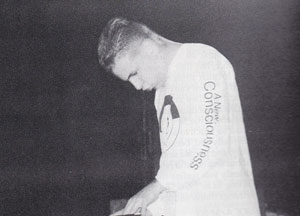 "That does conform to the rock myth, the working class, basically unintelligent person whose only way out is through music,' he scoffs. "This is a mythical figure which has existed since the fifties. And there's no way, for example, like the Rolling Stones and the Beatles, people try to fit them in there but John Lennon was as middle class as they got. And he was a very intelligent person. Like take Mick Jagger and Keith Richards, they're middle class. There have been a load of lies spread about rock music. All these ideas of what artists should be. And most are completely rubbish.
"That does conform to the rock myth, the working class, basically unintelligent person whose only way out is through music,' he scoffs. "This is a mythical figure which has existed since the fifties. And there's no way, for example, like the Rolling Stones and the Beatles, people try to fit them in there but John Lennon was as middle class as they got. And he was a very intelligent person. Like take Mick Jagger and Keith Richards, they're middle class. There have been a load of lies spread about rock music. All these ideas of what artists should be. And most are completely rubbish.
"The classic is that artists are these free wheeling spirits who are mediums for this talent that flows through them, and it's all a gift and they don't try hard. Every artist that I ever met is an incredible disciplined person who works like hell for what they do.
"If you sit and write a song, you need a lot of self discipline. You're not going to hang around and suddenly, like a bolt, out it comes. That does happen, but very rarely. Most people sit around in a room and work like hell. It is a labour of love and that does take away from that work element," he admits. "So I am trying to shoot down this ridiculous cliche myth. It's a very romantic thing that a lot of people go for, but it isn't true."
People are trained to think artists are on a higher, more sensitive plane: surely they can't be like everyone else! Some true geniuses are up there, but too many lesser artists use that as an excuse to act as eccentric as they please because they can get away with it. "Actually, I shouldn't be shooting the idea of stars down because it's always an escapist thing for people to want stars. There's too much information though at present and you can't believe it anymore. It's a myth that cannot be sustained, especially with people like Madonna, who is one of the hardest working people in her stardom. It dispels the star thing totally, as I don't see Madonna as a star whatsoever."
She's a great PR person: she should open up an agency. "Exactly. And people like Prince are willful, but he undoubtedly put an enormous amount of time and effort into what he does. But he has that star quality because of his erraticness. He has this genius where he tries and sometimes it's total shit and sometimes it's really good. That erraticness, the willfulness, not a single, dedicated thing." He suddenly pauses, dramatically declaring, "So upon saying that, I suppose what I am saying is that I am not a star at all either! But I enjoy what I do and other people enjoy it too."
Performers have the nerve to go on stage and expose their talents to the world. This does put them in a separate category. They have the ego to charge people to see them perform! The average person certainly doesn't need that applause; they have no desire for it. So perhaps that is the star quality. It's a type of bizarre egotistic bravery.
 "Yeah, when you look upon it like that. It is this strong self belief. That's a very good way of putting it. I think that's what marks out those people.
"Yeah, when you look upon it like that. It is this strong self belief. That's a very good way of putting it. I think that's what marks out those people.
"I've been talking a lot about techno music, which has been very influential on this album. And people sympathize with me, and come up with analogies. Punk is a classic analogy, because technology is such a liberating thing and it does mean that anyone can do it. But ultimately there are stars, there are people who genuinely have a talent, and there are some people who can never make music to save their lives."
If you use punk as an analogy remember the Sex Pistols only happened once, but they generated such a hype stardom that many bands tried to catch immortality by following in their sloppy tracks.
Mike scoffs, "There's so much rubbish spread about the Sex Pistols. Example a: that they couldn't play. That's total crap; they were extremely proficient musicians, they had been in bands for years. The great thing about the Sex Pistols was John Lydon, in that he was a star. He had so much to say, and he had attitude to match it.
"But it is really sad, because we were doing this promotional tour in Germany, and people said they had John Lydon in, and they were taking about techno, and he was saying that techno is utter rubbish. And suddenly you realize that he is now the sort of person that he was objecting to in 1976!" he dramatically exclaims. "Techno has a lot of things that are supposed to make rock music good. It's very
progressive, it's exciting, it affects a lot of other areas of the youth culture aside from music and it does alienate a particular generation . And there John was, alienated!" he grins with a sly chuckle.
Techno and rave hasn't yet had a total
impact in America. It's a very confusing area, with some of it sounding like bad disco and some of it sounding like bad industrial. "There is a lot of positive thinking going on, but you're right, it hasn't hit the mainstream the way it has across Europe. There are people saying that it's going to need soemone who is halfway house introducing it. And maybe we'll be part of that," he modestly declares. I knew that claim was coming! "Because every interview we do we harp on about techno, because it has been a huge influence on this album, despite the contradiction that this is intended as a rock album. But we'll deal with that later," he dismisses before I can stop him. "If we can be a part of the change, as soon as somebody who has a strong pop sensibility hits, the whole thing will be thrown wide open. How long did it take for punk to break over here strongly? Years! If you listen to Sonic Youth and Nirvana you would think it took 16 years! Isn't 1991 the year punk rock broke?" he mocks slyly.
It's the year the actual record buying public finally directed which way that boat was headed rather than letting the recorsd company man the marketing helm. "That does restore your faith in imitations that are out. The baby Nirvanas, and that's really part of the decay of rock music. Yes, Nirvana is fabulous; it is one of my favorite rock
albums in a long time. But it's not really going anywhere, if you're going to be cynical about pop music. I can't get excited about loads of other bands all of that ilk because it means we just revert back to the 1970's."
That's been Jesus Jones war cry: they're not mining the depths of turgid 70's rock and roll, maaan, for their sonic inspiration. "Right! Because it's all just a variation of the 60's! It is really depressing. I disliked that Manchester stuff for exactly the same reasons, but they went for the 60's. I am living now. I am not particularly young, I am 28, but I still find 1993 far more interesting than when I was listening to the Sweet or Slade," he expounds.
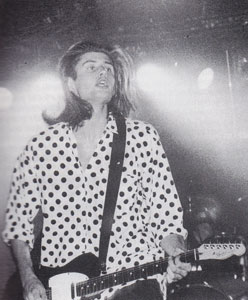 Too much of 70's music was terrifying. Why was there punk? That's why so many people romanticize punk because at first it did give a massive kick to the stagnate corporate butt. So why are musicians celebrating the very music artists reacted against in the late 70's? "There's this kitsch aesthetic that's coming through this music, this 'it is so bad it's good thing.' For a while it was a laugh, but with fashion it seems to have gone overboard. Kitsch is out of control. This is a ridiculous statement, but with Manchester, when flares came back out, it was just 'oh no, no, no!' Ok, it's kitsch, it's a laugh, but suddenly it became very serious!" he frowns. "Now it's happening with all sorts of things. Now we have the glam revival; we're in mid swing of that back home. We had the punk revival,, and apparently there's a new romantic revival on the way."
Too much of 70's music was terrifying. Why was there punk? That's why so many people romanticize punk because at first it did give a massive kick to the stagnate corporate butt. So why are musicians celebrating the very music artists reacted against in the late 70's? "There's this kitsch aesthetic that's coming through this music, this 'it is so bad it's good thing.' For a while it was a laugh, but with fashion it seems to have gone overboard. Kitsch is out of control. This is a ridiculous statement, but with Manchester, when flares came back out, it was just 'oh no, no, no!' Ok, it's kitsch, it's a laugh, but suddenly it became very serious!" he frowns. "Now it's happening with all sorts of things. Now we have the glam revival; we're in mid swing of that back home. We had the punk revival,, and apparently there's a new romantic revival on the way."
London has gone completely insane. You can't even go clothes shopping there unless you're content with the same tacky clothes you wore in the 70's. I hated 70's fashions. Nostalgia has gotten so ridiculous we'll soon be seeing last week's fashions instead of last
decade's "A lot of people have this theory that it's end of the millennium panic. People are running around in ever decreasing circles. There's this subconscious fear of the future that these people have. I'm not quite sure how it makes it way through to the human psyche, but then I am not scared enough of it. So I don't see it!"
So
we can be assured that Jesus Jones will continue moving in a forward musical direction? "I'd like to think so. Let me deal with that contradiction that I came up with earlier." Think I'll try to stop you? "I keep expounding the virtues of techno, and yet Perverse is deliberately a rock album. Our original idea for Jesus Jones, which was a good one, is that dance music, being the only progressive form of modern music there is, has so much to teach rock music. It is where dance music is very representative of society now. Technology, the whole revolution in computers, television, satellite; this whole high tech thing is very much a part of our society. Techno reflects that, where as rock music has stopped doing that." Mike at this point is talking so quickly that his ideas are coming out as one continuous thought. He's dazzling in his real time speed. "Now, what we wanted to do, we know that we wanted to come out and criticize rock music left, right and center. You cannot do that unless you have a solution. 'This is wrong, but this is how it can be improved.' That's what we are doing. By using the influences of techno, the way that the album has been made is unique for rock music, in that every performance on the album, bar vocals, is digital information. Nothing was recorded on tape. The guitar parts, the drum parts, were all played straight into my computer in the studio next to my bedroom. So when we went into the big studio with the producer, I just picked up all my samplers and a whole bunch of floppy disks and said 'here's the floppies, here's my voice, let's make the album." All the original performances were recorded in that way. Now that is unique in rock music, that is unheard of, and that has been a major point for us.
"The sad thing is that is standard for techno. That's how everyone does it. They say 'well, I played it all on my computer, that's how music is made, isn't it?' No. So the contradiction lies in that whilst it is a rock album, there's more dance music in this one, in the way that it was made. Most of the sounds that are in there, the unnatural guitar sounds for 'Tongue Tied,' they're obviously sampled. There are big beefy guitar sounds but there's something unsettling about them. It's that artificiality of it that I wanted to go for. There's this element all the way through the album of unusual sounds all the time. The bass lines aren't obvious bass guitar sounds, they're more like breathing..."
Mike finally takes a breath to make sure I am still with him. I am, but I'm a little dizzy. That's what I love about Perverse, those minor sound explorations that constantly burrow under the surface texture creating that extra depth. "That's right. So that covers the contradiction angle, in that our problem was in that the idea of mixing dance music to influence rock music came and went two years ago. We got hijacked by the Manchester scene and that indie dance thing. And inevitably, because there wasn't much worth in it, it died off quickly. And the true exponents, people like EMF, Pop Will Eat Itself and the Shamen, had to look for something different. For the Shamen, they jumped ship totally and went flat out techno. EMF went completely the other way; they went back to guitar rock. Pop Will Eat Itself have been dropped, which is really sad. So that leaves us carrying the flag!"
After this proud conclusion Mike sits back, cocking an inquisitive brow my way. Oh, I have to talk now... I shouldn't have had that wine with dinner, but I had just avoided death in the Lincoln tunnel. The loud mantra that's banging about my brain like a trapped moth is Jesus Jones is a band. That's the major difference when Mike's comparing them to techno, and that's what ties them to rock. People can go to see Jesus Jones and still get a dynamic live band experience. Mike has another experience that he can relate to this statement. There's no getting around him! He describes the Slough festival, where in the midst of an indie rock line up the two bands who went down best were Jesus Jones and Utah Saints. "The fascinating thing
was they went down better than anyone else that day except us. Indie fans are quite willing to accept this music, but it has to be presented as a band. Because frankly, whatever my immense respect for techno is, rock music still has that edge when it comes to playing live. There are few things better than having that live chemistry created by a bunch of individuals."
As far as techno artists who won't tour, Mike stresses, "You have to admire it because it is a complete rejection of the normal system. They're not interested in being stars. It's very difficult for people like me and you to understand that because we are totally obsessed with that idea. You have 21 year olds who are just interested in playing their computer games and making music. And the whole stardom thing is a total load of crap as far as they are concerned."
I am also thinking disco acts didn't tour either. But to be generous, perhaps this new generation doesn't have the need to massage their egos on stage. "It is a generation thing. Because they are saying that our values are irrelevant to their life. You can be shocked by that, but everyone needs to be shocked by that. You end up standing aside and looking at their values and going 'well, I respect that. Here lies the difference between us. It doesn't mean I can't appreciate it.'"
I can also appreciate it but I've stood in too many audiences and experienced that physical rush that comes from perfect on stage focus. It's too seductive a feeling and millions of other musical fans live it like we do. Mike's not arguing, but he does describe that many clubs are bringing in DJ's and mixers who actually create the dance music in an attempt to introduce a live factor. He notes, "There are many problems still in techno music, but you have to remember that it is still and incredibly young art form. Another thing people would say about techno, which is quite true, is that it doesn't have the ability to express a range of emotions. Rock music does have an edge over it on that front. As a writer of music, that's one of the reasons that I wanted to stick with a rock music format, because I can't express myself through techno. It doesn't have that flexibility yet. But this is because techno hasn't developed that ability yet. You don't expect a child to write a novel. That's my analogy."
When it develops that flexibility, I will accept it as a complete art from. Art always needs to generate emotions. Still, there are those hardcore dance groups like the Utah Saints who are making a big move mainly due to plenty of hype, much to my dismay. When I honestly evaluate it, I find that too much hardcore dance music doesn't translate into enjoyable at home listening, it becomes stunningly tedious.
Mike's finally ready to argue. "That's a specific thing for each individual. I find that I do listen to it. I brought with me some of the hardest techno music I've ever heard in my life. Ian and I went to this huge rave in Berlin and we went to this record shop in East Berlin and bought loads of music that we can't get at home. And some of it was just terrifying in its stupidity and its brutality. The hardest techno is fabulous because it has no redeeming qualities. Absolutely nothing, no musical talent at all."
Isn't that what I said? If we're talking children then that music is the nasty brat of the scene. Mike laughs, "It is the black sheep of the family. It's the antihero, the Clint Eastwood character in The Good, the Bad and the Ugly."
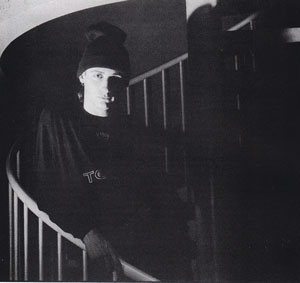 That's the noise that simply pounds at you without remorse, much like an obnoxious brat with pots and pans. Our man who must not get headaches admits, "I enjoy that, there's an aesthetic to that that is very enjoyable for a short amount of time. I have to say I can listen to that stuff in a club for about an hour, because that's when it starts to get so heavy. But there is a lot of listenable techno. I have got some ambient stuff with me, and then there's all that stuff that came out of Detroit that is pioneering in making techno listenable. That's very interesting stuff, and it's starting to push the bounds of technology."
That's the noise that simply pounds at you without remorse, much like an obnoxious brat with pots and pans. Our man who must not get headaches admits, "I enjoy that, there's an aesthetic to that that is very enjoyable for a short amount of time. I have to say I can listen to that stuff in a club for about an hour, because that's when it starts to get so heavy. But there is a lot of listenable techno. I have got some ambient stuff with me, and then there's all that stuff that came out of Detroit that is pioneering in making techno listenable. That's very interesting stuff, and it's starting to push the bounds of technology."
Of course all this techno colour relates right to Jesus Jones. They could be that legendary techno Trojan horse. "I have had some great arguments on this tour, because techno does really miss a lot of American people. It's fascinating because it gives me a mission to be on. I suppose that's too holy and bit too pompous, but it is fun to have a purpose in life," he grins in satisfaction.
If you believed certain descriptions put down on paper, you'd swear Mike's purpose in life is to be a raving ego maniac, instead of the personable charmer he is in the flesh. The funniest American piece was that ludicrous Rolling Stone bit. They were totally offended by Mike, instantly affecting this 'who the hell does this brat think he is attitude. Mike is laughing anew, exclaiming, "I really liked that one. It got a lot of people's backs up. It was perfect. There is a value in pretentiousness, and we explored that on this album in that it is glamourous, it is unusual, and that's what you want out of music. There are some people who are inordinately pretentious and the better for it. Take Prince, take Michael Stipe, two people who I admire; how pretentious can you get? But there's this small element to their personality which is absolutely repulsive. And that bit in Rolling Stone, that's what I was after, by putting people's backs up. Some poor sod wrote in and claimed 'well, look what we got Terance Trent D'Arby?' There was no appreciation of the fun in it. And that's sad, because this guy is saying that no one should be exceptional. That's what being pretentious is about, being larger than life!" he defiantly grins.
People secretly wish they could be pretentious for just 15 minutes, Andy Warhol style. "Someday we'll all be pretentious for 15 minutes!" Mike busts into laughter, almost unseating himself.
Speaking of pretentious, Mike had done his zany "120 Minutes" stint earlier in the day and he was appalled to discover that many videos he requested weren't available. "I asked for about six or seven and all they had was Consolidated. It was their song called 'Tool and Die,' which is about gun control, which is a refreshing
thing for people outside America to see, because these bloody Europeans have this idea of America being the wild west with everyone shooting each other at every opportunity. That is fairly absurd but..." He laughs as I pretend to shoot him. He laughs so hard he forgets what he is saying. It's sad when two people get this silly over stupid jokes.
He then neatly steers the subject back to the press. I thought he was losing it. "The problem is Americans are beautifully honest people. And British bands take complete advantage of that. How often do you see a British band over here and they say something ludicrous to the American journalist? 'Oh, do you really own the Eiffel tower? Oh yeah, I see.' That's a ridiculous
example but you do find that..."
Hey, Mike... I dangle my charm braclet which just happens to have a miniature Eiffel tower on it before his eyes. "Oh, so you own the Eiffel tower! I didn't know that! That example backfired, didn't it?" he splutters with total self mockery.
I'm loving catching him, just like I adore every minute of that new album... now that's flattery! It is sad to listen to the radio and discover how ludicrously simple it is to find something to be perverse against! "Yeah, that's the sad thing. It's a joke calling this album Perverse, because it is so sad that by merely using technology to make a rock record you can be different. It shouldn't be that easy. We should be having to try really hard to be perverse!
"America has dominated popular culture for the better for the last 30 years. But that empire is coming to an end, and it's making Americans very negative about their country. When I first came over I was saddened by this country that I thought was fantastic, and there were people who really hated their country. The potential here is so great. But there's this introvertedness that's breeding conservativeness. And that is spreading around the world, because people still look to America for modern pop culture."
Great, so London's gazing back fondly on the 70's disco era and America's gazing fondly back at Black Sabbath. Modern pop culture Jesus Jones may be our techno pop saviours. One last silly query before we both fall asleep, and hurrah, it does have to do with pop culture. Are there any James Bond themes sampled on this album? "No, there aren't. I know why you're saying that... like the end of 'The Devil You Know' and parts of 'Idiot's Stare.' What it is that minor scale ascending thing going on."
I thought I had you there. "It is much more influenced by a middle eastern thing... oh, now I've gone down a street that I can't reverse out of," he suddenly exclaims in amusement. "With a track like 'Idiot's Stare,' that came from listening to a track from Bulgarian voices. There's no samples of anything, but the influence. I was looking for that element of melancholia on that one."
Oh well,, it was a stretch. "Not at all, it wasn't a stretch at all, it was a strong thought."
And it's my last strong thought for the night. We end by discussing Mike's nose because a friend thought it indicated ancestry in a distinctive region of Italy. Any Italian roots? Mike doesn't know of any, exclaiming, "It's a lot of nose to analyze."
As we walk him back to his hotel talking of computers and TV news shows, he dead stops, pressing that very nose to a display vase full of... Simpsons artwork. Bart's his man. I am seeing scary parallels between British muscians. Is Bart Simpson the link between American and British modern pop culture? Fascinating thought, eh?
US/Canada Perverse Tour Quotes and Dates - April/May 1993 - Click for a bigger version
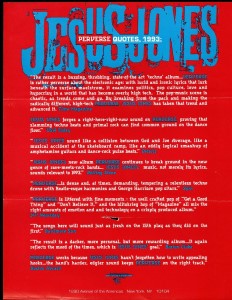
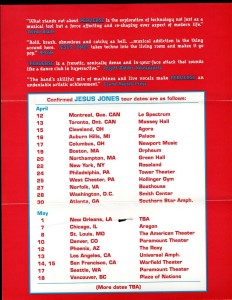
US Perverse Tour Date Poster - 15 May 1993 - Click for a bigger version
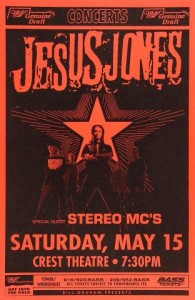
Japan Tour Poster - June 1993 - Click for a bigger version
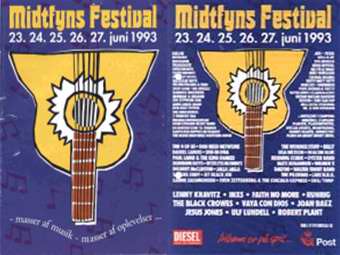
Review of London Marquee gig - NME - 17th July 1993
There is something fundamentally wrong with Jesus Jones: they have no sense
of the ridiculous. They are loathed by every man, woman and child in Christendom,
because they are a plasticine pop group who refuse to accept the fact that they
are the stuff of three-minute-flavoured pop sweets. They are The Monkees who
want to be Emerson, Lake And Plamer; five Mike Nesmiths.
This is, of course, the reason why adolescents (bless their clumpy boots) love
them. The Joneses combine every inflection of world-beating pop kings with all
the serious-minded bravado of youth snottily intact. They are a humourless hit
machine for those too young or too blinkered to want anything like wit, glamour
or sleaze to come up and kiss them on the lips every time you reach a chorus.
So why they're good tonight is a bit of a mystery. It could be because, for
once, they're not out to oppress us with their vision of technological future
pop, but just here to chill out stomp sixe ten boot-prints over their old singles,
and make a few mid-teenage hearts gooey. Who knows?
Either way, for a good ten minutes they are wonderful. 'Info Freako', always
a clumsy rock-techno thumper, sounds even more frenzied than usual.
'International Bright Young Thing' whooshes by like pop with a 12 certificate,
messy and colour-blind.
Then just as we are about call Ladbrokes and cancel all bets on quite how appalling
they are going to be, Mike then introduces 'Magazine' and leads us on the slippery
slide into dullsville.
Devoid of their '70s tunefullness, they become a splurge of high-tech glad-rags,
all bulging eyes and crashing synths but no soul, no seduction, to carry us
along with it.
'Victoria', a ghost of warmer glories, makes up for it, but still reminds us
that somewhere along the way the plot got lost, and then lost again. There's
a decadence inside it, of old London and old love affairs decaying into ashes,
that's as far removed from 'The Devil You Know' as a bedsit from their current
nest in the arms of America, and it shows in every line.
What's happened to Jesus Jones is that they've somehow swallowed their own techno-hype
and become a band that exists as a pointless prototype of soemthing that no-one
wanted in the first place.
Who really wants rock groups who bang frantically on synths and tell us it's
(heaven forbid) the future? We've got rap, dance, indie and hoary old rock getting
off with each other all over the place, and that'll do us quite nicely, thank
you.
Consequently they live in a world where 'Right Here Right Now' (admittedly a
great pop record, but not the work of Nostradamus) gets played on the radio
every five minutes, and where EMF are supposed to be interesting, Jeez.
The question is, cosseted as they are, do Jesus Jones feel real anymore?
If so, I'd like to know.
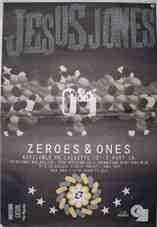
Interview - Volume Seven CD Magazine - July 1993
It's time for iconology with Mike Edwards.
icon: the number 1 (as used by computers to indicate on or go)
"I think that as soon as that first digital figure 1, meaning go
for computers, appeared in 1946 or whenever it was that the first computer
was introduced, we automatically entered a new world. The whole thing
about computers, the whole thing about what Jesus Jones are doing is that
it could only have existed within the last, say, five years and that's
a constantly moving thing, I'd like to say that 'Perverse' could only
have been made in the last three and computers are a very large part of
that, in a way, because that's the way you achieve the sound."
icon: the sampler - ideally the Akai S950
"The evening I got my first sampler, I just sampled everything for
about twelve hours solid and, at that moment, I suddenly realised that
this stuff opened up far more creativity, contrary to the typical knee
jerk reaction that any sort of digital equipment results in something
cold and inhuman, it struck me that there was so much room for more creativity,
so much room for more fun by using this technology."
icon: The Aphex Twin
"The Aphex Twin is one of these rare people in any form of music,
who make records that are immediately identifiable without being formulaic.
There are certain sounds that are typical of him - the way his records
have this sort of doomy quality all the time, where everything is swamped
in reverb and sounds marshy in a way, but in a hyper-digital way, a modern
way."
"Just the way that he's always experimenting with sound means that
he's going to be one of these people who pushes music forward. 'Didgeridoo'
is a record that will go down in the annals of popular music history.
In ten years time I think that that will be seen as a hugely influential
tune and years before its time. There are other great pieces he's done
as well, like the ambient thing, which is taking something that a lot
of people are doing and doing it in a totally different way. And, of course,
he's been doing it since 1985, so he's way ahead of the rest anyway."
icon: Cyberpunk and William Gibson (but don't mention Billy Idol...)
"Cyberpunk has come to represent the decay, the crapness of modern
culture as well as the shininess. I don't think that anyone since the
'50s has seen the future as being a bright shiny, hermetically sealed
sort of thing. The Cyberpunk thing represents that perfectly in that you
have got stuff that's falling apart very badly and it isn't all mega new,
it isn't optimum equipment. And I think the Aphex Twin fits in with that
too. In fact the only very shiny, ultra-modern records are the ragga stuff
or the Stock Aitkin Waterman pop - that is hermetically sealed."
icon: Tokyo
"I think Japan, in particular Tokyo, is iconic, perhaps because Blade
Runner was originally supposed to be set in Tokyo - perhaps because
of all the Manga stuff (ie half-brilliant, half-rubbish Japanese comics,
films and cartoons), where everything is always set in neo-Tokyo. But
I feel that it does represent the perfect blend of modern life, because
the traditions are very old and are still a very important part of Japanese
society. And the way that technology and techno music are so anonymous
means that it's perfect for the Japanese, because you get Japanese musicians
and DJs who don't have to worry about whether they look right or can speak
the language or not. There's also something about the way Tokyo looks.
Perhaps it's the neon lights harking back to those Kraftwerk covers. It
could be any number of little things - the society, the look of the place,
the pace, the frenetic activity of the city as a whole.
"For me Tokyo is iconic of the technology, of the new age and I think
that, for a lot of people, it is becoming the new cultural centre, as
opposed to New York or Los Angeles. There's something sort of very decadent
about the place - all the clubs seem to be very seedy. They always seem
to be places that have little holes in the wall that you have to climb
through."
"It's not exactly hellish, but there's something a little bit furtive
about the clubs there that gives you a great feeling, a decadent feeling
that you're involved in a world that is totally out of the ordinary."
icon: San Francisco
"For about the last year the cliche that rolls off the lips of anyone
who's been there that is that the scene over there is like the Summer
Of Love here in '87, although the last couple of times I've been there
it doesn't seem quite as happening as it was two years ago, when there
was definately something major going on. But something is going on there,
you've got people like Terence McKenna, the whole industry surrounding
the Virtual Reality thing, that whole sort of new way of thinking that
goes hand-in-hand with techno music, is very much a San Francisco thing.
It's the American side of techno."
icon: the Knowledge Club
"For me there is one club in London that has the best of what is
happening in techno, Knowledge, where you'll find the movers and the groovers
who are making things happen. That in a way is what techno is all about
- people coming together with ideas and music, not in a competitive way,
but just to exchange views and find out what they have in common. It's
one of the great reasons why techno is more exciting than rock music,
because rock music is such a bitchy sort of thing."
icon: Lenny Kravitz
"Someone like Lenny Kravitz is the absolute antithesis of newness,
of modernity, of interesting new ideas. The sort of person who is under
30 making music, that should have been left out in the rain in the '70s,
who has obviously got only one or two major influences musically and fashionwise
and is based in the past is the complete opposite of techno and to a large
extent are the enemy."
"They're preserving the status quo and once you do that everything
stagnates and, if our art stagnates, what happens to our sciences, our
philosophy, or our thinking? When new ideas become unacceptable then I
think people have very little left to offer each other or the world and
my main grudge against this kind of nostalgia thing is that it encourages
people not to change and it tells them that they are right to stagnate
and that classic rock is a good idea. It encourages the people who make
the trends by saying that by staying the same, by keeping things in the
past, they are right."
"The worst thing in the world is for Suede to be popular because
it means that they are right. Because it represents total stagnation and
total lack of imagination or new ideas."
icon: Madonna (in a pointy bra)
"Well, Madonna represents sex in the '90s because she presents you
with an absolute lack of mystery, which indicates that sex is now so acceptable
and so obvious on every level that there really isn't any mystery left
to it. You can either see exactly, close up, what a woman looks like or
you can get the idea that sexual problems are all very normal and nothing
to get worried about, that's the two extremes of it. And it just takes
away any of the mystery. I think we all know far too much about sex in
a way to make it all that interesting."
There's probably a great rise in celibacy because people aren't interested
in it any more, we know too much about it. And Madonna represents that
totally in the way she's made it all bare, I mean that book was probably
the death of interesting sex in that there was really nothing left for
the imagination. It was a very, very dull book, it really managed to make
sex uninteresting in a major way."
icon: Spiral Tribe and the techno circus
"One of the reasons I really like Spiral Tribe is that, for most
people involved in music, the worst thing they're ever going to get is
a bad review in a newspaper - whereas the worst that Spiral Tribe are
going to get is being beaten up by the police, having all their gear confiscated
and being sent to prison, which is a very severe form of musical criticism,
if you like."
"The way these people are embracing a totally different sort of techno-crusty
lifestyle, it's interesting that you have got a lot of people like Eat
Static - from the Ozric Tentacles - and Back To The Planet, who combine
the two ways of thinking it's a fascinating idea that this alternative
lifestyle goes along with the techno phenomenon. It's a very Cyberpunk
thing."
"It's people like The Shamen, the people who run Knowledge, who have
a newsletter going for their club, trying to bring people together and
motivate people, not in a corny hippy way, but in an interesting way,
doing new stuff, it's that whole scene that I find fascinating and ultimately
it all comes down to computers, because computers hold the key to the
way the future will go, from solving ecological problems to making better
music."
Japanese Crossbeat Magazine - August 1993
The full six page interview from the Crossbeat magazine can be viewed here. It is a pdf document to preserve the Japanese characters sized at 11mB and will open in a new window.

